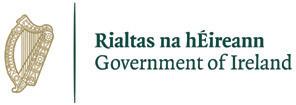





































































































































































































CHRISTMAS and a prosperous new year





























































































































































































































CHRISTMAS and a prosperous new year


























Editor: Denise Maguire
Creative Director: Jane Matthews
Designer: Alan McArthur
Production Executive: Claire Kiernan
Managing Director: Gerry Tynan
Chairman: Diarmaid Lennon
Email: info@ashville.com or write to: Better Business, Ashville Media, Unit 55, Park West Road, Park West Industrial Estate, Dublin 12, D12 X9F9. Tel: (01) 432 2200
All rights reserved. Every care has been taken to ensure that the information contained in this magazine is accurate. The publishers cannot, however, accept responsibility for errors or omissions. Reproduction by any means in whole or in part without the permission of the publisher is prohibited. © Ashville Media Group 2025. All discounts, promotions and competitions contained in this magazine are run independently of Better Business. The promoter/advertiser is responsible for honouring the prize. ISSN 2009-9118 SFA is a trading name of Ibec.
, a magazine dedicated to the small business community.
Recently, politics has taken centre stage once again with the General Election in November. Ahead of the election, the Small Firms Association published its manifesto which detailed its proposals to help businesses tackle, among other things, crippling costs. One of the key asks was for the next Government to develop a roadmap to future proof the sector and to replicate the political energy and policy focus which brought so many multinational companies to our shores.
e SFA circulated its manifesto to almost every candidate ahead of the election. It is hoped that the needs of small businesses will feature prominently in the next programme for Government, which is being negotiated by Fianna Fail, Fine Gael and independent TDs at the time of writing.
e nal quarter of 2024 was busy in the SFA’s event calendar. In December, the SFA held its annual Christmas Evening which featured an on-stage conversation with prominent business broadcaster Conall O Móráin. A month earlier, over 350 people gathered for the SFA Annual Lunch at the historic Round Room in the Mansion House. e theme of the event was ‘Irish Grit, Global Greatness’. e lunch featured Irish acting legend Colm Meaney, who gave interesting insight into his career and the Hollywood experience.
As we begin the new year, the Entrepreneurs section of Better Business focuses on gym owners and personal trainers while the Health page casts an eye on Season A ective Disorder (SAD), which is an issue for many during the winter months. With St Patrick’s Day on the horizon, the Sector Spotlight feature looks at one of Ireland’s greatest export success stories, Irish Whiskey.
Going into the new year, the SFA will be holding two signature events. e Business Connect conference will once again take place in the Killashee Hotel in Naas, Co Kildare on the 6th of February. On the 26th of March, the annual SFA Small Business Awards will take place in the RDS. e year ahead is going to be an exciting time for the SFA, who will be under the wise guidance of Geraldine Magnier, recently re-elected as chairperson for a second term.
As always, Better Business contains stories that will both inform, educate and inspire. Many of the businesses featured in this publication are the lifeblood of the economy, both locally and nationally.
Better Business is the magazine of the small business community. We welcome your feedback, suggestions and ideas to info@sfa.ie on X (Twitter) @SFA_Irl
David Broderick Director, Small
Firms Association

Big News for Small Business News, views and profiles from SFA members and small businesses in Ireland
22
Cover Story
Ricardo Batista at Noesis chats about why the need for excellent service will never change
36 Policy
There was broad support for small businesses during the General Election campaign
46
Arts and Culture
Interview
In her second term, SFA Chair Ger Magnier is continuing her hard won momentum on projects and initiatives
31
Top Tips
Sinead Gallagher o ers five tips on how best to support project managers and achieve success
38 HR With Statutory Sick Pay and Sick Leave entitlement days on the up, what do employers need to be mindful of?
New CEO of Ealaín na Gaeltachta Rachel Holstead talks about making a di erence in her new role 50 Travel
Denmark is rated among the world’s very best locations for doing business
16
Sector Spotlight
Some of the leading figures in Irish whiskey talk about global uncertainties in an evolving industry
34
Business Challenges
An increasing admin burden and requirements around reporting are taking their toll on small firms
41 Health
Tobba Vigfusdottir on the impact of SAD and what we can learn from the Nordics
55 And Another Thing…
Insuring against a potential CAT bill could be a prudent step, writes Bernard Walsh
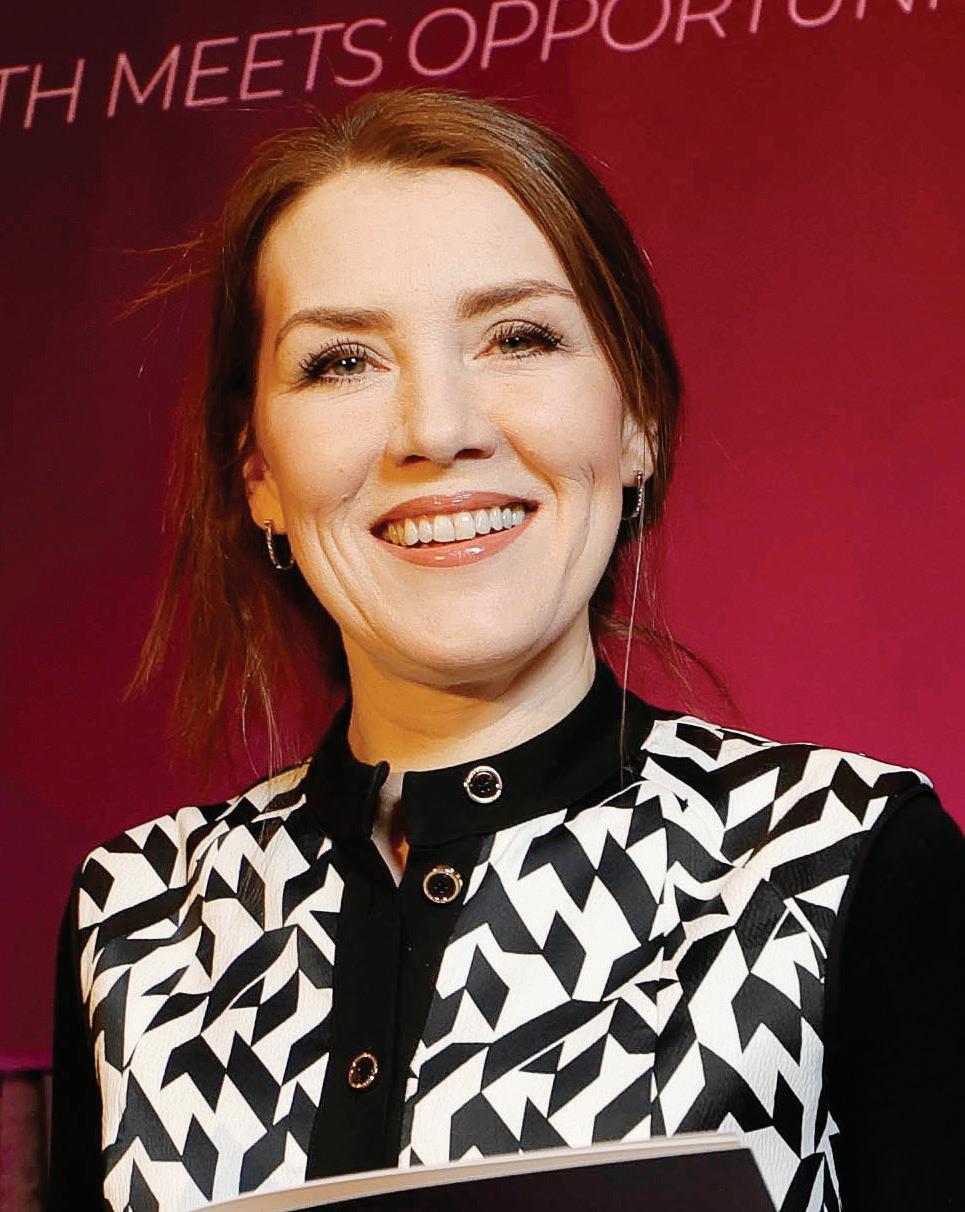

FROM TOP LEFT: Geraldine Magnier is looking forward to a second term as SFA Chair, page 11 // Boann Distillery’s Pat Cooney on building an international brand, page 16 // Des McCarthy, CEO at Microfinance Ireland, talks about increased lending limits and helping microenterprises realise their ambitions, page 22 // Tobba Vigfusdottir on the impact of SAD and what we can learn from the Nordics, page 43
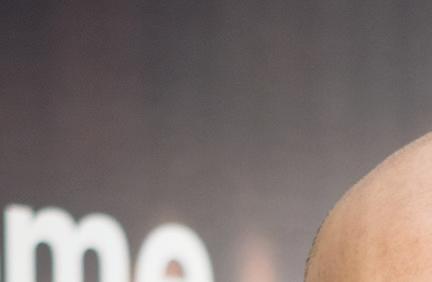












Sharon Cunningham, CEO of Tipperary-based Shorla Oncology and Orlaith Ryan, CTO of Shorla Oncology, have been named the 2024 EY Entrepreneurs Of The Year. Sharon and Orlaith were also named winners in the emerging category at this year’s awards. Shorla Oncology aims to improve existing oncology treatments and is focused on indications where existing treatments are limited, in shortage, or the drug applications are inadequate for the target population. John Mackey (CEO), Ruth Mackey (CSO/COO) and David Mackey (CTO) of Mbryonics Limited were named 2024 EY Established Entrepreneurs Of The Year while Ivor Queally, CEO of the QK Group South Africa, was named 2024 EY International Entrepreneur Of The Year.
Techies Go Green has revealed the findings of a survey which found that just over half (54%) of companies have a formal sustainability policy or strategy in place. The research – which involved 41 business and technology professionals – found that a further 39% are developing a formal sustainability policy or strategy. Almost three quarters of respondents (73%) said sustainability is very important in their company’s overall strategy. Despite this, 29% of technology or business leaders do not currently track their carbon emissions and 32% track them but have not set specific targets. Less than a third (32%) publicly report on their sustainability efforts. Of those who do not, 35% are planning to start. There are over 600 members of Techies Go Green across Ireland and abroad, with the aim of growing that number to 1,000 members.

JPK Fencing, headquartered in Claregalway, Co Galway, proudly marks its 50th anniversary in 2025. Renowned as one of Ireland’s premier suppliers of security and access systems, JPK Fencing has become synonymous with unwavering quality, punctual delivery and exceptional workmanship. Over five decades, they have dedicated themselves to fostering strong, long-lasting relationships with their team, customers and suppliers, building a reputation as a reliable partner in the industry. To celebrate this significant milestone, JPK Fencing will host a series of events throughout the year, honouring the collaborations and connections that have defined their success. These events will not only commemorate past achievements but also set the stage for future innovations and continued excellence in service.
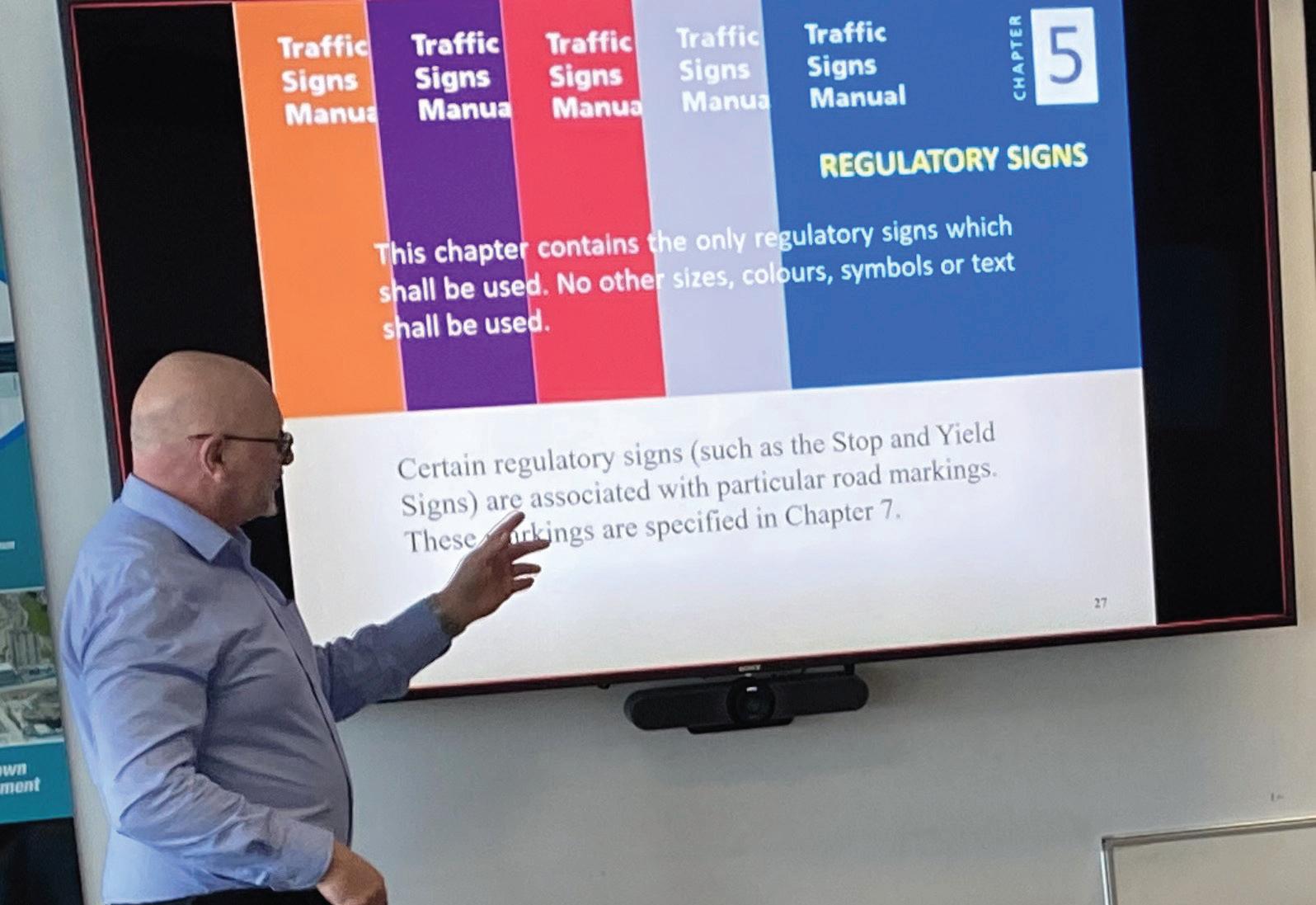
Cinnte Safety Limited has announced the launch of a new Subscription Plan, tailored specifically for small and medium-sized enterprises. This innovative plan offers a range of services, including the Workplace Traffic Management Plan (WTMP), while allowing businesses to spread the cost over a 12-month contract. Many organisations are unaware that they require a WTMP; however, if their premises involve vehicle, plant, and/or pedestrian traffic, it is a crucial Health & Safety requirement. By signing up to the Subscription Plan, organisations can save up to 15% of the full price of the WTMP. Having successfully launched its HR Support and Safety Support services last year, Cinnte Safety initially invoiced clients monthly. Now, in partnership with Payzone, the company has streamlined its payment process. Clients will receive a single invoice at the beginning of the year, accompanied by a clear schedule outlining their monthly payment collections. Cinnte Safety has also expanded its offerings to include Traffic Management [TM] Support, aimed at companies that require Traffic Management Layout Drawings (TMLDs) and Traffic Management Plans (TMPs).
Arranging a WTMP is simple. Follow the link to get started: https://platform.payzone.ie/customer/11273/product-list/details/12460
Total Power Solutions was recognised as the Ireland & UK Top Performing EcoXpert Partner for Service Order Growth for 2024, by Schneider Electric at the EcoXpert event in Leeds. Dominick Byrne from Total Power Solutions said: “This award highlights our commitment to delivering exceptional service and innovative solutions to our clients. Our team’s dedication to growth and excellence has truly set us apart and we are proud to be a part of Schneider Electric’s EcoXpert program. A heartfelt thank you to our amazing team and partners for their hard work and support. Together, we are driving progress and setting new standards in the industry. Here’s to a future filled with continued growth and collaboration!”





The Veterinary Ireland Companion Animal Society (VICAS) has launched a nationwide AMR Survey of Pet Owners as part of its commitment to the One Health National Action Plan on Antimicrobial Resistance 2021-2025 (iNAP2). VICAS, the interest group of Veterinary Ireland representing Companion Animal (Pet) vets in Ireland, formally launched the Survey at the Vet24 Conference in the Gleneagle Hotel in Killarney. The survey is completely anonymous and should only take a few minutes to complete: https://www.surveymonkey.com/r/ VICASamr2024
“Antimicrobial resistance happens naturally over time. However, the rate of antimicrobial resistance is increasing because a huge number of antimicrobials are being used across the world in humans, animals and the environment,” said Dr Jane Pigott, VICAS Chair and Veterinary Ireland Vice President.
“AMR is being made worse by overusing antimicrobial medicines and by not using antimicrobial medicines correctly. The result of this is that common infections are becoming more difficult to treat and multi drug resistant bacteria (the so called ‘superbugs’) are developing. This is a problem because many antimicrobial medicines do not work to treat these multi drug resistant bacteria or superbugs.”

Corporate law firm Flynn O’Driscoll LLP has merged with commercial law firm Vincent & Beatty LLP, a move that reflects both firms’ commitment to expanding service offerings for their diverse client base. James Duggan, Managing Partner at Flynn O’Driscoll, said: “We are delighted to welcome Vincent & Beatty and their team to Flynn O’Driscoll. Their reputation for excellence and their deep roots in the legal sector are a perfect complement to our own client-centric approach. This merger is not only an opportunity to broaden our expertise, but it’s also part of our ongoing strategy to expand and diversify our practice to better serve our clients’ evolving needs. It also provides further opportunities for our colleagues to develop professionally. We are proud to continue the journey as a leading full-service law firm in Ireland and we look forward to further growth opportunities.”
Digital agency Granite has acquired Coalface, a Limerickheadquartered data science and digital marketing company. Granite’s workforce will now grow to more than 145 digital specialists and revenues are expected to exceed €18 million in 2025. Coalface manages over €220 million in annual online revenues across 68 countries. With this acquisition, Granite’s customer base expands by over 20 blue-chip clients, including Aer Lingus, An Post, Allianz Care, Laya Healthcare and Continental. . Adrian Feane, CEO of Coalface, will join the Granite team as part of the acquisition. “Having already worked closely together with Granite on multiple projects, we could clearly see the benefits of a full integration of our operations to deliver more complete solutions for our highly valued clients. This new venture creates further opportunities for us to shape a more data led approach to how marketers define their digital strategies,” said Adrian.
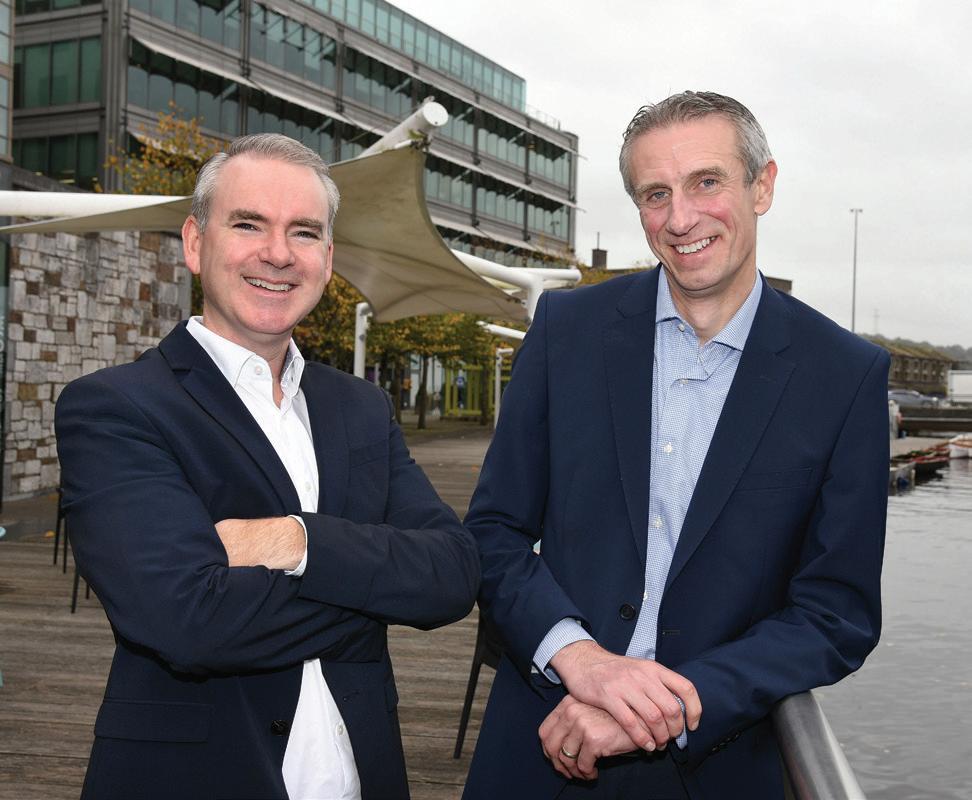
@SFA_Irl
The Small Firms Association calls for a roadmap to ensure the viability and prosperity of the small businesses community in its General Election Manifesto which can be found here: https://ibec.ie/sfa/ campaigns/ sfa-electionmanifesto… #Irishbusiness #GE24 #GE2024
@RTEbusiness
The Central Bank has warned of the risks to the economy from the Trump administration in the US imposing tariffs and tax changes which would affect US multinationals in Ireland.
@VDombrovskis
Honoured and pleased to start my mandate in the 2nd @vonderleyen Commission. I will spare no efforts to uplift EU’s competitiveness as well as coordinate the work on bureaucracy reduction. Committed to stand by #Ukraine in its fight against the agressor Russia.
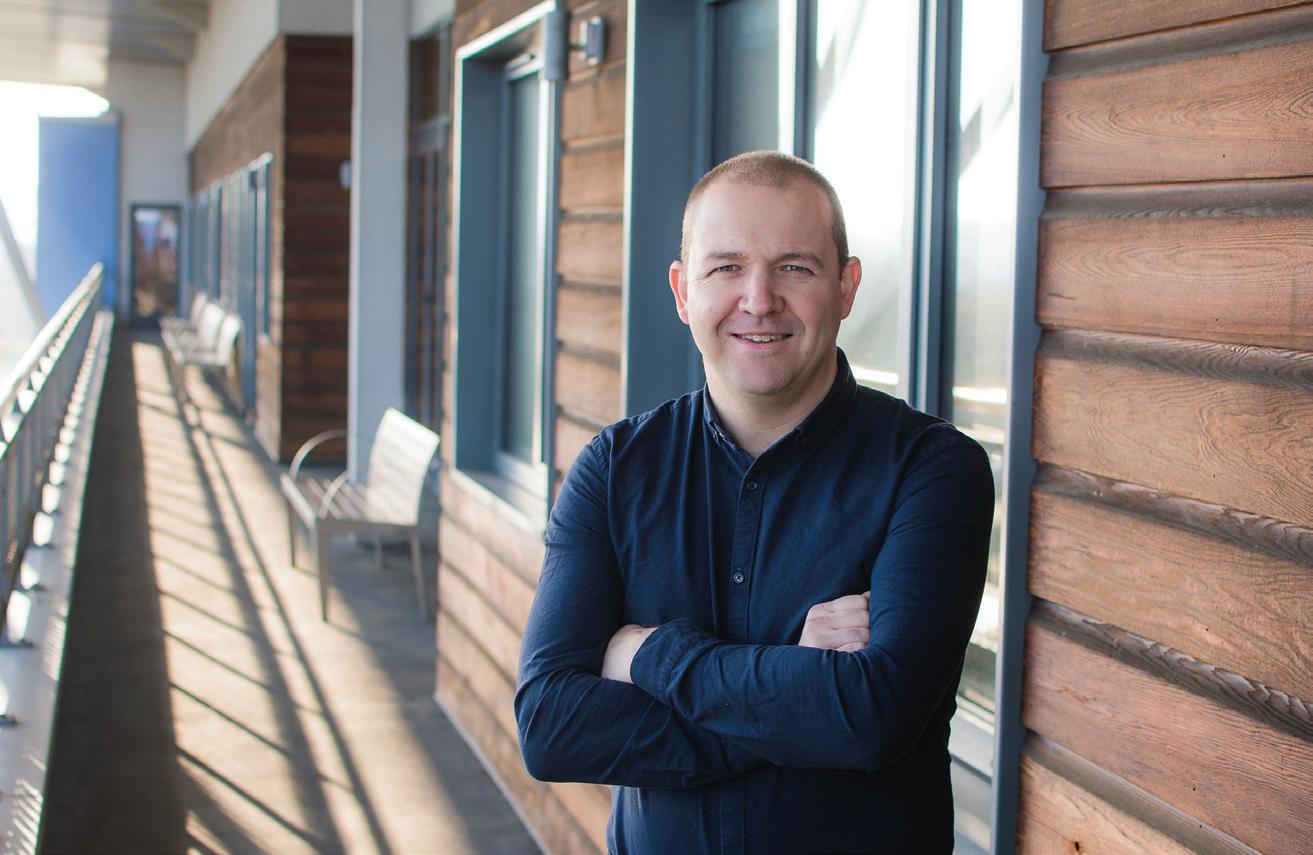
ICT solutions and services provider Datapac has announced the results of a new survey which explores the use of AI tools and applications within Irish-based organisations. It found that a majority (84%) of businesses are already using AI tools in their day-to-day operations. However, nearly a third (30%) reported that employees within their organisations are independently sourcing and using unapproved AI tools. As these unapproved tools have not been subject to due diligence, many are concerned about the impact of such practices, with 39% highlighting worries over the quality and integrity of data produced. More than a third (36%) of IT leaders expressed fears that such tools could disrupt established workflows by reducing operational efficiency, while 40% pointed to the lack of formal processes as a critical issue hindering consistent and reliable AI use. Despite these challenges, AI adoption remains a top priority for Irish organisations, with 89% planning to invest in AI tools and applications over the next year.

“The next Government needs to put small businesses at the heart of its programme. The best way to do this is to develop a roadmap for small businesses that will foster economic growth for the second quarter of the 21st century.”
David Broderick, Director of the SFA, launching the publication of the SFA General Election Manifesto

“We acknowledge that Ireland is a small, open, trading economy which is more exposed to international shocks and a change in direction to a more protectionist global economic model. Our successes are not inevitable and we cannot take for granted the progress we have made.”
Jack Chambers, Minister for Finance, ahead of the General election

“We’re not here just to ‘rise above’ or endure – we’re here to build, to create, to shape what lies ahead. Let’s not settle for being called resilient, as though we’re simply surviving all the time.”
Geraldine Magnier, Chairperson of the SFA, addressing the annual SFA Lunch


Artificial Intelligence is transforming the way we work and how we recruit. With a clear understanding of the demands of recruitment and retention, Rent a Recruiter has launched two new tools to help companies hire faster and better quality candidates. The AI Salary Bot provides realtime salary benchmarks and benefits data tailored to industries and regions in Ireland, the USA and Australia. By eliminating the need for time-intensive manual research, this tool ensures that HR teams can align offers with current market trends. Complementing this, the Rate Your Recruitment Process tool offers a free assessment, scoring hiring strategies across five critical areas (employer branding, hiring practices, candidate experience and diversity & inclusion) and delivering practical recommendations for improvement. “By integrating AI into our services, we enable HR professionals to concentrate on strategic decision-making,” says Barry Prost, Chair & Co-Founder of Rent a Recruiter & Dublin Regional Skills Forum. “Our goal is to integrate technology into our processes to enable employers attract and retain top talent in today’s competitive candidate market.” These tools empower HR teams to optimise their processes, reduce administrative burdens and focus on building effective strategies to succeed in the ‘war for talent’.
New data from LinkedIn shows that companies in Ireland with less than 250 staff are more inclined to recruit workers in remote positions, with 12.6% of all people hired by these employers working remotely. A year prior, large enterprises (5000+ employees) would have accounted for a higher proportion of remote roles, with 13.9% of all hires in the 12 months up to July 2023 accounting for these positions. A year on, however, the proportion of remote hires by large scale companies fell by almost a fifth and only accounts for 11.6% of recruits made up to July 2024. The latest LinkedIn data continues to show that employers in Ireland are promoting flexible working as the new normal compared to other European countries, with 37.3% of all postings offered hybrid working and 8.1% of jobs ads were for remote roles in October 2024. LinkedIn Ireland Country Manager Sue Duke said: “Job seekers are clearly looking for flexibility at work, whether that be remote or hybrid, and this can be a way for organisations to stand out to potential candidates especially in a tight labour market.”


































































































RECENTLY ELECTED TO A SECOND TERM AS CHAIR OF THE SFA, GER MAGNIER IS LOOKING FORWARD TO ANOTHER TWO YEARS TO CONTINUE HER HARD WON MOMENTUM ON PROJECTS AND INITIATIVES
Magnier is Co-Founder and Director or Idiro Analytics, a pioneer in the field of advanced analytics and AI. In 2021 she co-founded the Idiro Analytics Ethics Centre, a visionary initiative that aims to foster collaboration across industry, academia and government, to ensure that AI technologies are human-centred, fair and trustworthy. She is passionate about nurturing the adoption of inclusive AI that benefits all sectors of society and has high hopes that small business owners in Ireland can use it to create efficiencies that help level the playing field for them.
“We’ve been in AI, analytics and data for over 20 years. One of the things I observed was that the efficiencies that investment in AI or analytics can create in businesses tended to be the preserve of larger firms. My ambition when I came in was to digitise a lot of small businesses and help them on that journey,” she says, reflecting back on the goals


she began working on in her first term.


“Small businesses around Ireland needed more than just a web presence, they needed to look at their own digital transformation journey in order to remain competitive and with margins getting tighter, they needed to create more efficiencies.”
At the beginning of that first term, there was a lot of talk about “dual transition”, both environmental and digital, but she feels “neither of the two happened as fast as was hoped”. “When ChatGPT came to market it opened up AI and made it more accessible to everybody, which was great.”
However, she was surprised at the lack of uptake of AI by small firms, even though it holds so much potential for businesses without their own IT departments. “It shouted out to me that there was a larger problem that’s systemic, that we’re not really understanding what’s going on with small business.”
She concluded that small business owners were “punch drunk” after a seemingly endless barrage of blows to deal with – GDPR, Brexit, Covid, the energy crisis. The cumulative effect of these crises has left small businesses firefighting and unable to focus on improvement. “I realise now it’s not what you can
bring to small businesses. A lot of it is down to their own absorptive capacity to be able to avail of, for instance, new technologies.”
Governance and regulation are also putting additional onerous demands on small business owners. “They don’t have the ability, the departments, the scale, within their resources to deal with all of those demands.” Even well-intended Government supports are often blunt instruments that not every business can avail of and Magnier sees her role as vital to lobby and help shape future policy.
“Having spoken to the Government over the last two years, I think the message is finally hitting them that one size cannot fit all when you’re offering supports.” One such example, where the criteria were exclusionary to many businesses, was the Increased Cost of Business (ICOB) grant; the Government signed off on a package of €257 million in Budget 2024 as a once-off grant payment, seen as a vital measure for small and medium businesses, to be rolled out via local authorities. The grant was based on the value of the Commercial Rates bill received by an eligible business in 2023. “It wasn’t a targeted approach and therefore many businesses couldn’t avail of the support – small companies working from home or in a hub or in a serviced office, for example, where you may have your own floor but you’re not paying rates.”
She has firsthand experience from her own company, of the difficulty of even tracking down the real owner of their office, which turned out to be a wealth management company, not the landlord they dealt with.
Areas like this are where she feels the power of being part of an organisation like SFA comes from, so she can, on behalf of members “bring back from what’s happening on the ground so as to try and shape different policymaking and approaches for small business.”
Another initiative which she hopes will make a big difference over the next year is a Large Business Stretch Pledge to help small businesses through partnerships with large businesses.
“There are a couple of really big bottlenecks coming down the track for businesses,” she explains. “Trying to find a way, as a small business, to become a supplier to a big company is becoming more intricate.”
To this end, the SFA is partnering with Ibec on the Large Business Stretch Pledge, to encourage large



businesses to make their supply chains more diverse and to include smaller businesses.
“If we look to what has been achieved under diversity and inclusion because large businesses have set about making it happen—now we’re going to do the same around supply chain.” As the saying goes, what gets measured gets done, and she looks forward to seeing the results next year. “By the end of 2025, halfway through my next new term, I will be able to have figures on how much money has been put into the small business ecosystem as a result of just that initiative alone through the SFA and that’s very important to me.”
“SMALL BUSINESSES AROUND IRELAND NEEDED MORE THAN JUST A WEB PRESENCE, THEY NEEDED TO LOOK AT THEIR OWN DIGITAL TRANSFORMATION JOURNEY IN ORDER TO REMAIN COMPETITIVE AND WITH MARGINS GETTING TIGHTER, THEY NEEDED TO CREATE MORE EFFICIENCIES.”

Magnier on the notion of a treble bottom line:
PROFIT
“As Chairwoman of the SFA, I want to emphasise, more than anything, the people behind the business. Stop making it an object. It is very, very personal. It is a person that is trying to pull this off.
“By creating critical mass in a membership base, it means that our voice is heard when we go to talk to different groups, be it agencies or ministers. It’s not just anecdotal evidence. We have the stats. The membership is really important for making impact, not just influence, but real impact for everybody.”
Geraldine
Magnier, SFA Chair
Seeing this project come to fruition is one of the reasons she was delighted to be invited to consider running for election for a second term as Chair. “I was thrilled because it means I can ensure some of the initiatives that I kicked off in my last term will come to fruition in the next term.”
Hand in hand with this initiative goes another project that she hopes will significantly impact small businesses. She says the onerous nature of the CSRD reporting requirements for small businesses are “another thing that is going to add to the cost of doing business... it’s not only time-consuming, but it’s exceptionally complex.”
While a small business may not technically fall under the scope of CSRD, “they must comply to de-risk being sidelined in supply chains.” To help small businesses deal with this, the SFA has partnered with EcoEasi, an AI-powered platform simplifying ESG reporting, to help members comply with CSRD requirements. Use of the platform will be available to SFA members as part of their membership. She is delighted to be able to offer this to members, to “take that cost away from small business and allow them to continue to enter tenders and not forfeit any revenue streams just because they don’t have their figures around CSRD done.”
Another issue that Magnier considers vitally important to drive the conversation around is the social impact of small businesses as key players in community stability. “I believe we don’t talk enough about the social impact and that small businesses are key players as community level economic stabilisers.”
Under the ESG banner, environmental and governance metrics are more easily measured, but not social impact. “If we did have that measurement, we would realise the value of our small businesses across the country.”
During the summer of 2024, the SFA undertook an outreach to all 949 county councillors across the 26 counties to take the temperature of issues at a regional level, “by talking to the councillors on the ground who are going up and down their own streets and talking to their own local people the whole time.” No prizes for guessing that housing was top of the list in every corner of the country. “I think probably the biggest problem we have is that we never realised how much our population would grow, either organically or through immigration. We never knew it was going to be this big, this fast. And that’s one of the things that’s managed to create a lot of problems for us as well around transport.”
Another worrying trend is that women are increasingly having to step out of the workplace due to childminding issues. “It feels like a regressive move, considering how progressive Ireland is around parity and equity in the gender,” she says. “It generally is women. Before, I used to be nervous about saying that, because I’ve tried to be quite inclusive of different arrangements and families and I try to avoid being anecdotal about it, but as the longitudinal studies continue, the evidence is suggesting that it is women predominantly that are affected by this.”
The impact of flooding on certain parts of the country was another huge issue. “Some of these floods have decimated business and stocks and it’s taking them a long time to replenish it. It means a lot to small businesses.” She is passionate about the importance of recognising the personal impact of business decisions on owners and their families and calls for more sensitivity towards small business owners.
“In my chairship – chairwomanship – I really want to drive home the message that small businesses aren’t just a separate entity. The name over the door or the person behind that business has an impact on their family and their community if things are going right or wrong.”
She points to numerous cases of small businesses borrowing from friends and family just to stay afloat in the last few months. “I really want to emphasise the social and the personal aspect of this. When we talk about sustainability, I look at it not just around the environment.”



Actor Colm Meaney was the special guest at the 2024 SFA Annual Lunch, a thought-provoking and inspiring event
On the 8th of November, over 350 people gathered for the SFA Annual Lunch at the historic Round Room in the Mansion House. The theme of the event was ‘Irish Grit, Global Greatness’. It was an incredible event, full of amazing insights, discussions, but most importantly, it was thought-provoking. SFA Chair Geraldine Magnier gave a speech about the challenges facing the small business community, while igniting a sense of pride in what the sector has achieved.
The special guest was actor Colm Meaney who took to the stage for a fireside chat with SFA Director, David Brodrick. He talked about his successful career, with some interesting insight into the Hollywood experience.

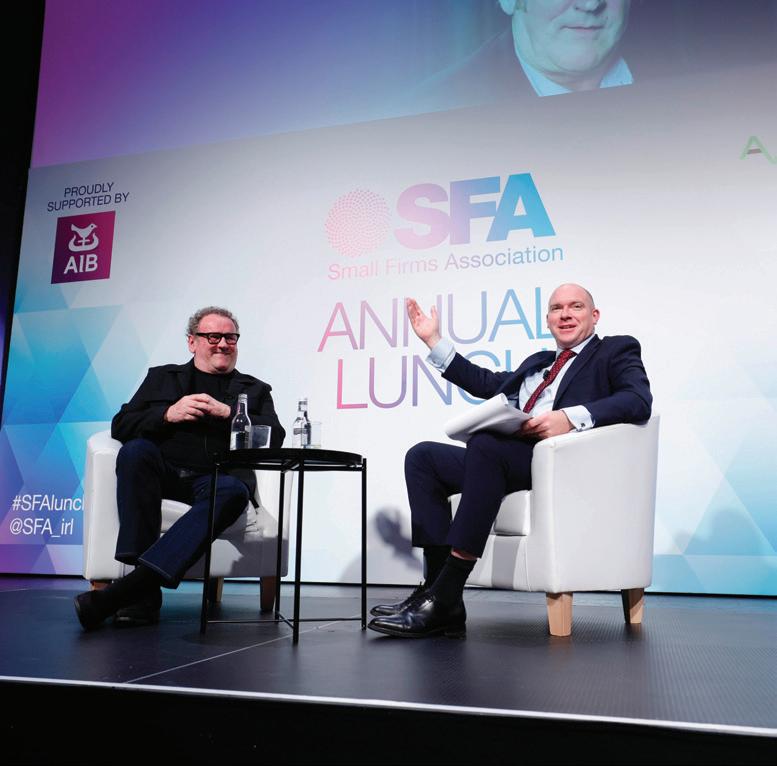




Businesses gathered at a special briefing to find out who’s been nominated at the SFA Small Business Awards
On the 10th of December, the SFA held a briefing to announce the finalists for the SFA Small Business Awards which will take place in March 2025. The event brought together the nominees selected in the nine award categories, as well as the emerging business category. After the briefing, SFA members gathered for the SFA Christmas Evening. The reception opened with a speech from SFA Chair, Geraldine Magnier. The event concluded with an interesting conversation between business broadcaster Conall O Móráin and SFA Director, David Broderick.













DEANNA O’CONNOR SPEAKS TO SOME OF THE LEADING FIGURES IN IRISH WHISKEY ABOUT GLOBAL UNCERTAINTIES IN AN EVER-EVOLVING INDUSTRY




The Red Book of Ossory, a religious manuscript published in Kilkenny in 1324, contains the first recorded reference to distilling in Ireland.


However, the long-standing industry has entered a new age, after experiencing huge growth over the last 15 years. According to the Irish Whiskey Association, in 2010, there were only four distilleries in operation, while sales were under five million cases. Compare that to six million cases sold to the US alone in 2022.
There are now over 40 distilleries on the island.



The US is the major market for Irish whiskey, representing about 40% of sales, but with a postCovid decline in sales and Trump’s threat of tariffs on imports under the new administration, it’s making a lot of people uneasy. Despite this, global spirits sales

are expected to improve incrementally in 2025, and the International Wine and Spirits Record (IWSR) rates Irish whiskey as a promising emerging player.
“We continue to be broadly optimistic about the future of status spirits, but expectations were scaled back during 2023, reflecting a less stable economic outlook globally,” says Guy Wolfe, Head of Status Spirits Insights, IWSR. Their latest available figures show cautious optimism for growth. “Globally, Irish whiskey saw a value change of -1%, 2022-2023. This follows a value CAGR of +22%, 2019-2023. It’s projected to see a value CAGR of 4.5%, 2023-2028.”

It’s a cash-hungry industry to get into as a distiller, given that the rulebook for Irish whiskey dictates a three-year maturation until you have a product to sell. However, with the value of Irish Whiskey exports to the all-island economy exceeding one billion euros for the first time in 2022, it is a potentially rewarding one. Other income streams are vital to young distilleries – such as producing gin and vodka or entering the tourism market with visitor experience centres. According to the Irish Whiskey Association, at their pre-Covid peak, visitor numbers to Irish Whiskey distilleries and brand homes climbed to over 1 million in 2019.
Pat Cooney, who had a wealth of experience in the drinks industry under his belt when he set up Boann Distillery in 2019, was wise to this. Their cream liqueur business is a valuable cash cow, which he kept after selling off Gleeson Group drinks wholesaler and manufacturers to C&C in 2012.
Cooney reveals that 75-80% of their production is white label for major brands across America, Australia and the UK, including Aldi, Marks and Spencer and Walmart. This diversified revenue stream provides stability, allowing them to focus on building their Boann brand and stocks. “It gives us confidence for the future because if we were just distilling trying to fund ourselves, trying to build stocks, trying to build the brand, I think it would be extremely difficult,” he says.
They aim to build an international brand with Boann. “It’s still limited enough in distribution, but the Whistler brand, which has been selling for about seven years, is in about 60 markets.” Boann Single Pot Still Madeira Cask recently won a gold award at the 2024 Irish Whiskey Awards in the New Irish category and for “New Born” New Make Spirit in the Poitín category, while the Whistler brand took home awards for the Whistler Irish Cream Liqueur, Whistler Doppelbock Rye Cask Finish Limited Edition and Whistler Honey Whiskey Liqueur. With the challenges of the industry, he isn’t optimistic for the survival of the surfeit of small distilleries that have sprung up in recent years. “Most of them are pretty small and they might survive, but the difficulty with a distillery is that it’s cash-hungry. It takes a lot of cash and a long time, and so I would not be optimistic for the industry as a whole. If it’s 40 distilleries now, I wouldn’t expect to see 40 distilleries in five years’ time.”
While the industry is demanding of cash to keep a distillery going, he says the most difficult thing is to build a brand. “It takes a lot of money to build a distillery, it takes a hell of a lot of money to build a stock and then it takes huge success to build the brand. So it’s a difficult industry, but for those who stick at it and for those who have an idea of what they’re doing, the rewards can be very good.”
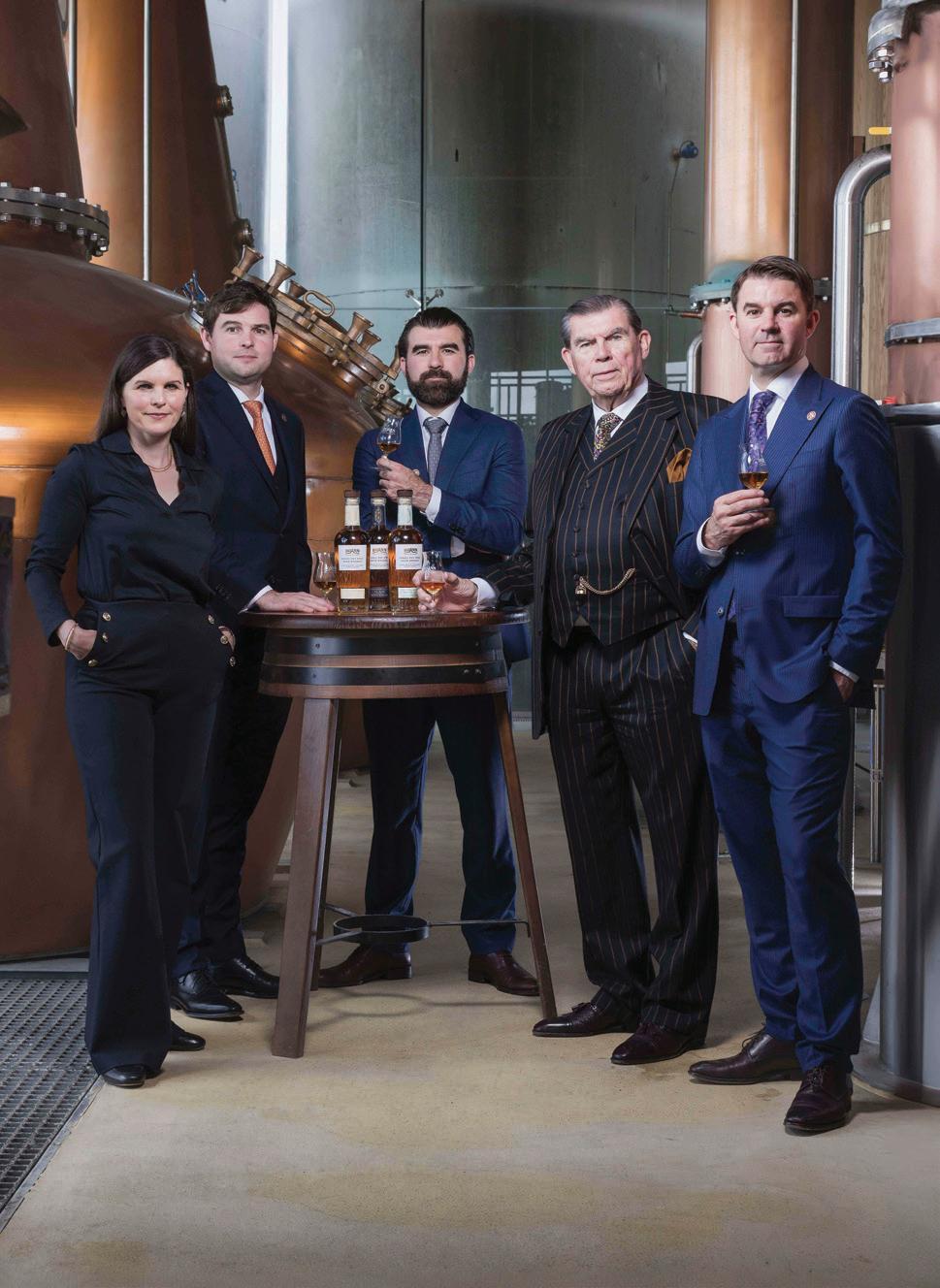
“IT TAKES A LOT OF MONEY TO BUILD A DISTILLERY, IT TAKES A HELL OF A LOT OF MONEY TO BUILD A STOCK AND THEN IT TAKES HUGE SUCCESS TO BUILD THE BRAND.”
All of the key inputs have been rising in price. There were significant increases in costs for grain as a result of the war in Ukraine, while increases in the costs of energy and barrels have also contributed to a challenging couple of years for the industry, he notes. And while he expresses concern about the Irish Government’s ability to prevent any potential tariffs imposed by the Trump administration, Cooney says, “The whiskey industry has been around for a long time and I think it’s going to be around for a lot longer.”
Despite what he terms “a soft spot” in the sector over the past couple of years due to global uncertainties and consumer reaction, he says, “We are very confident of our place in the future of Irish whiskey.”
Conor Hyde of Hyde Whiskey took a different approach into the industry. After graduating with a degree in Food Science from UCC and working for years in food marketing for Golden Vale and Dairygold, he set up his own marketing consultancy for food businesses. Then he made the decision to get back into the drinks business in 2014, carrying on his family’s tradition of ageing
and bonding whiskey. “We were publicans and blacksmiths in a place called Tinker’s Cross outside Bandon for 10 generations. We always sold good whiskey and good porter,” he says.
“The cask would be aged out the back of the pub and then when the cask was deemed good enough to drink, it was brought in and put on the back bar and tapped with a brass tap and a mallet. Up to 100 years ago that’s the way whiskey was sold in Ireland; it wasn’t sold in bottles, it was sold straight from the cask.”
He now operates his Hyde Whiskey brand through the bonded warehouse model, buying new make from distilleries and maturing and bottling it. “Bonding is a very old tradition in Ireland. It was done mainly by pubs and greengrocers,” he explains. “Distilleries didn’t have brands. They’d sell on the whiskey to third parties, who would age it and bottle and brand it.”
Many well-known brands such as Red Breast and Green Spot were founded in this tradition. Looking to get back into the whiskey trade, Hyde saw bonding as a more accessible entry point into the industry compared to investing in his own distillery. In a nutshell, he says, “We’re taking really good whiskey and making it taste fantastic by putting it in very good wood.”
“WE COULDN’T SOURCE ENOUGH WHISKEY AS BONDERS BECAUSE WE WEREN’T DISTILLING. NOW, THERE’S PLENTY OF IRISH WHISKEY FOR EVERYBODY.”
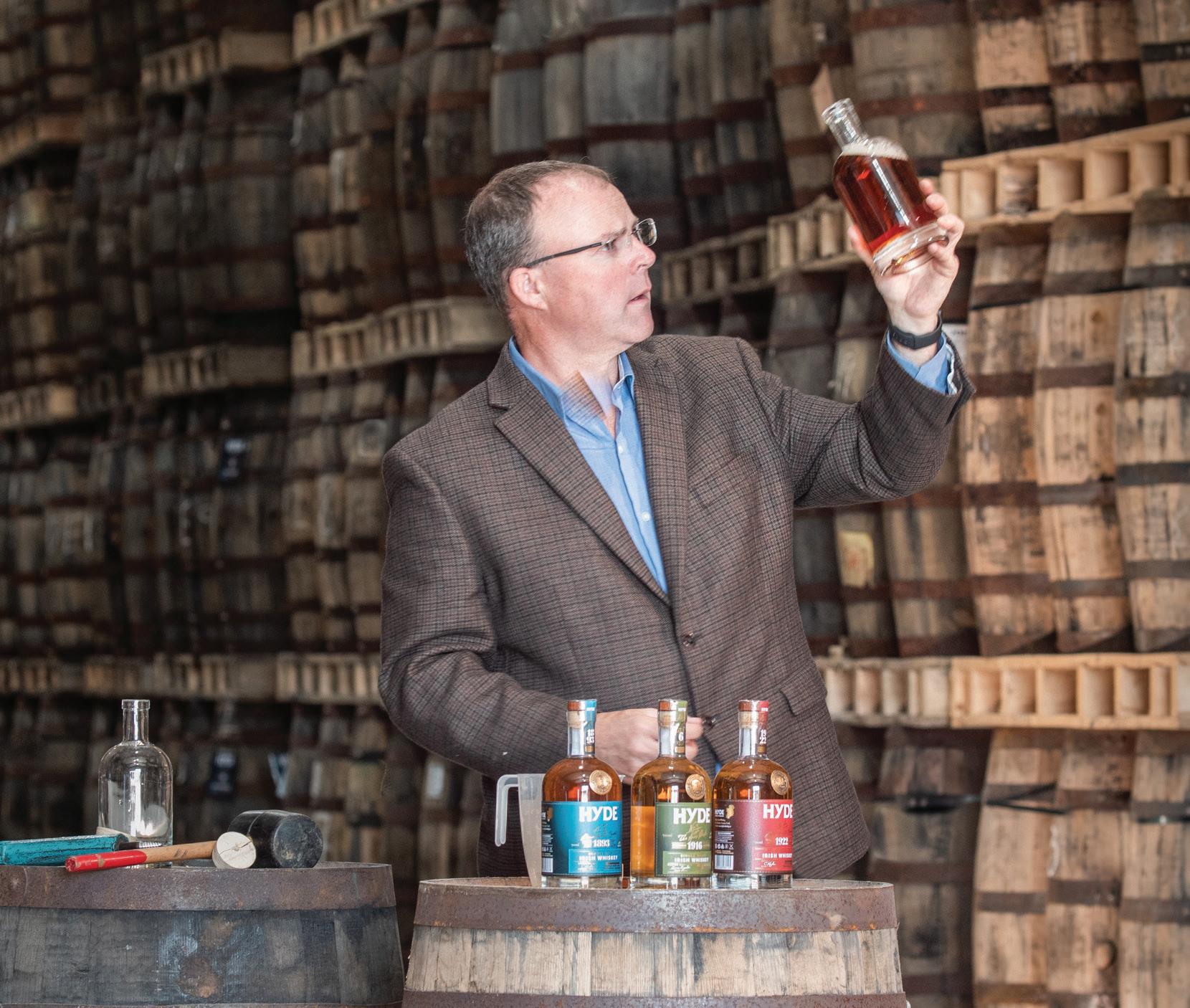
However, that doesn’t mean it’s simple; knowledge and expertise are required for bonding, particularly in wood management and cask selection. “Whiskey is only as good as the casks that you choose and you age it in, so there’s a lot of knowledge and expertise around grading and picking wood.”
They look for the provenance and quality of the wood, good cooperage and a specific char level – the insides are blowtorched to create a charcoal filter effect. “There’s nothing in the cask except wood and metal hoops. There’s no glue, there’s no nails, there’s nothing. Casks are made the same today as there were by the Romans.”
While many Irish whiskey brands are fighting for market share in the States, Hyde took a different approach. “When we started in 2014, there were probably only about seven whiskey brands and everybody was going to the States.” They took a strategic decision to “go where the others weren’t playing” and put their focus on markets in the East rather than the West, where the competition was already intense.
“The top three Irish whiskey brands account for 95% of all Irish whiskey sales in the States, so that means the other 200 Irish whiskey brands that are over there now are fighting for 5%.”
The company has entered markets like Taiwan, India, China, Nigeria, Uzbekistan and Kyrgyzstan, often being among the first Irish whiskey brand in these markets. The global success of Jameson has cleared a path for smaller brands like them, he admits. “Jameson breaks the ground in a lot of places and educates people about Irish whiskey and then when we come in as a more crafted premium product.”
They’re now in 65 markets worldwide and have found the support of Irish embassies instrumental in breaking ground and making contacts.
Building the brand in a diverse set of markets means they’re not as exposed to the potential tariffs coming from the US and the impact on the industry. The company is focusing on innovation and different cask finishes for different markets.
He sees two separate strands diverging – super premium and the trend for more approachable price points. “Consumers are looking for better value,” he says and it is putting a lot of pressure on the industry. “Costs are going up and the market is demanding good quality and a better price.”
However, on a more positive note, the fact that the production capacity of the Irish whiskey industry is growing has helped to reduce the cost base for bonders like Hyde.
“Initially, there wasn’t enough Irish whiskey; 10 years ago that was our biggest issue. We couldn’t source enough whiskey as bonders because we weren’t distilling. Now, there’s plenty of Irish whiskey for everybody.”
When a child loses their home, they lose their entire world.

There are almost 4,000 children homeless in Ireland. Donate now.

focusireland.ie 1850 204 205







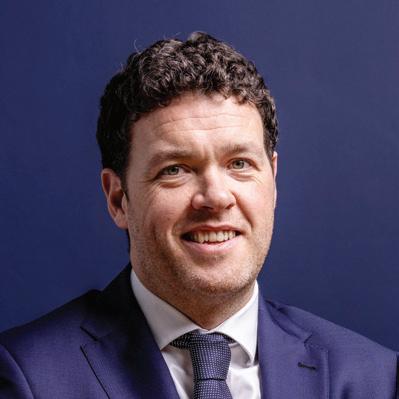
1 2
Audrey Jenkins Head of Customer Experience, Codex Office Solutions
Customer experience is not company size sensitive; every organisation should know their customers sentiment and understand their wants and needs. Surveying customers at each touchpoint of their journey will highlight areas that require focus and opportunities for improvement. Measuring customer CSAT, CES and NPS provides invaluable insights that will influence company’s strategic planning year on year.
Siobhan
Finn CEO, Community Enterprise Association Ireland (CEAI)
Build A Strong Network – and what better place than an enterprise centre or hub. Surround yourself with like-minded people. Seek out those who share similar values and ambition. Take time out to have that coffee and remember to pay it forward. One of your greatest assets will be a network which will open doors to opportunities, provide valuable advice and support your business growth.
3
David
Kavanagh Managing Director, Quest Retirement Solutions
Effective communication is key to the success of any business. This includes clear internal communication with your team, consistent interactions with partners and suppliers, and delivering a cohesive message to your target market. Maintaining clarity and consistency in all forms of communication is a foundation of any successful business. For any new business, having absolute clarity in this regard before communicating to others is a vital first step.
The real test is not whether you avoid this failure, because you won‘t. It’s whether you let it harden or shame you into inaction, or whether you learn from it; whether you choose to persevere.



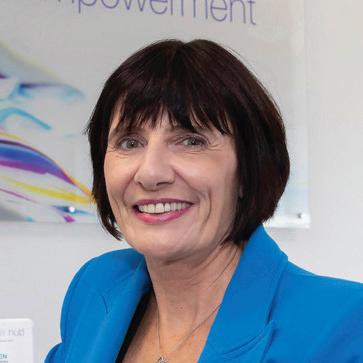
4 5 6
John McNicholas Director, Everlake
Pensions are the most straightforward and tax efficient way to pay yourself or extract profits from your business. They’re also a great way to reward and retain staff. Many people build their business up with the intention of selling it to fund their retirement. However, consistent pension planning allows you to enjoy the benefits of compound interest over the years. There’s no reason why you cannot do both!
Loretta Dignam CEO, The Menopause Hub
Staff are your biggest asset – but for some women, careers can be marred by the debilitating effects of menopause. Businesses are increasingly responding to women’s needs by offering flexible working hours, adjusted uniforms and desk fans. We offer workplace training, policy development and accreditation to help employers become menopause inclusive. By implementing these, you will create a workplace culture built on fairness and staff retention – and avoid legislative risk.
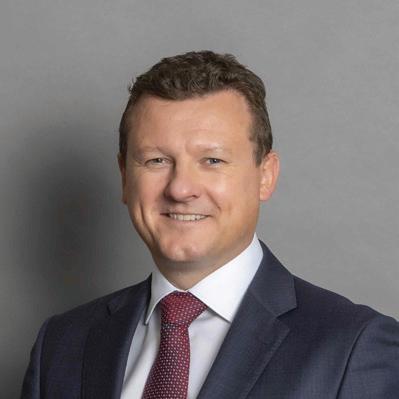
James Duggan Managing Partner, Flynn O’Driscoll
A term sheet/heads of terms can be a useful document to record the principle commercial terms of a transaction; it focuses the mind and provides some comfort that the counterparty is serious about transacting. Avoid the common pitfalls and consult your lawyer before signing – so many do not and it’s too late to renegotiate key terms!
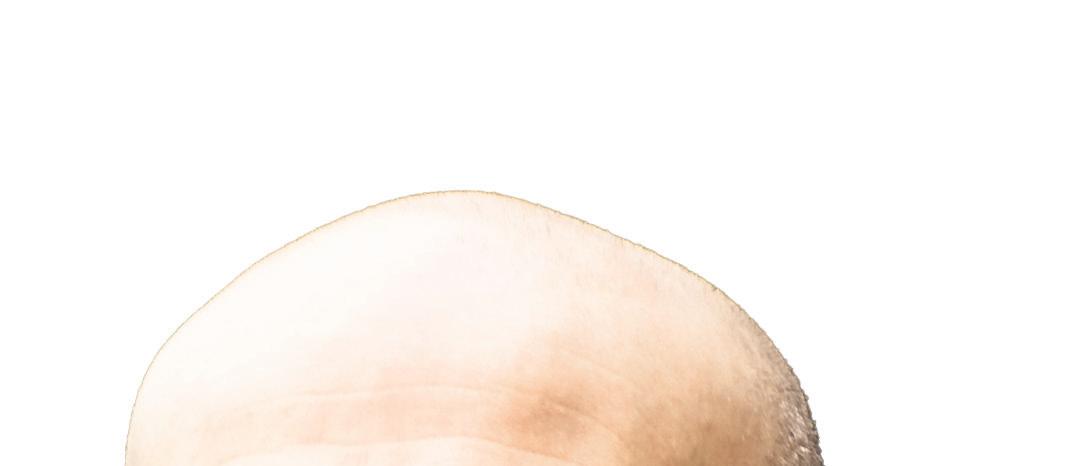



MICROFINANCE IRELAND PROVIDES SUPPORT TO BUSINESSES WHEN THEY NEED IT MOST. CEO DES MCCARTHY TALKS TO BETTER BUSINESS ABOUT INCREASED LENDING LIMITS, SUPPORTING THE ‘HIDDEN ENTREPRENEURS’ AND HELPING MICROENTERPRISES REALISE THEIR AMBITIONS
For Des McCarthy, his role at Micro nance Ireland is all about lending with purpose. at is, lending to microenterprises who can’t access nance from traditional lenders and who also tend to lack the resources they need to make their business nancially viable. Coming from a commercial lending background, it’s a refreshing change. “In many ways, it’s a very rewarding role. We get the opportunity to help people who are either working for someone else or are unemployed, but want to start their own business. It’s great to be able to help people realise those dreams. at’s what attracted me to the role, that idea of lending with a purpose and making a real di erence,” says Des McCarthy, CEO at Micro nance Ireland (MFI).
at ability to make a di erence was enhanced in 2024 when the Government made the decision to allow MFI to increase its lending limit to microenterprises from €25,000 to €50,000. For a whole host of small rms, across a range of industries, the increased loan limit was a game changer. In the latter half of 2024, approximately 25% of loans from MFI were for more than €25,000. “Not all of the businesses we support would be looking for the maximum amount of €50,000, but there are a number that would be. A large proportion are looking to access nance between €30,000 and €40,000. e increased limit was something we had sought for a long time, so we’re delighted to be in a position where we can help a larger cohort of businesses.”
MFI is funded by the Department of Enterprise, Trade and Employment, with additional support from the European Investment Fund. Its main remit is to provide nance to businesses that are unable to obtain loans from other commercial lenders, but it also provides a post approval mentoring service to borrowers through the Local Enterprise O ce network. Any areas where the borrower needs to upskill, whether it’s nance, marketing, production etc, an expert mentor will help ll in the blanks. It’s a system that bene ts everyone – by improving the borrower’s skills, they’re more likely to succeed and in time, repay their loan.
Mentoring is a core element of MFI’s service o ering and one that highlights its commitment to helping small rms grow and thrive, especially at the moment when small businesses are faced with so many challenges. “From our interactions with small businesses, there are two main challenges. One is the increased cost of doing business. e other is getting access to people. I think that’s probably the experience of most businesses across the country. Small rms make up a huge proportion of businesses across Ireland and they’re extremely important to us. We only deal with small businesses and I’d say we probably deal with the smaller end of that spectrum. Our average borrower would employ 1.8 people. ese rms start out small, but that doesn’t mean they
can’t grow to employ more people, in fact lots of them do and we can help them achieve that growth.”
Business was strong in 2024, with applications up on the year before. In 2023, MFI supported over 400 businesses which sustained about 575 jobs. In 2024, those gures increased further. Small businesses that want to access nance from Micro nance Ireland must have fewer than 10 employees and a turnover of less than €2 million. Research has shown that the main sectors availing of loans from MFI have been the wholesale and retail sector (20%), manufacturing (11%), other services (10%) and professional, scienti c and tech activities (9%).
Des has held the role of CEO at Micro nance Ireland for just over three years. Previous experience includes roles at KBC Bank Ireland and Eircom. “I’ve been a lender throughout my career so this role at MFI suits me. e focus is very di erent; we take on much higher risk than the commercial banks. By their nature, our borrowers are higher risk because the banks won’t and can’t fund them. But we can take that higher level of risk because we’re a Government supported initiative and our remit is to help microenterprises that are struggling. It’s about enterprise support and job creation and it’s about sustaining those small businesses that are so important to our economy.”
It’s o en said that the best time to start a new business is when the economy is performing poorly – things can only get better. But with the cost of doing business so prohibitive, is now a good time to set up a new enterprise? “ e challenges that we talked about earlier certainly exist and we’re obviously in a di cult environment, but I think it’s very encouraging that we’re not seeing a reduction in the number of people looking for loans to start up a business. ere is always opportunity out there for people who have a good idea for a business and are willing to take a risk.”
MFI is very much a national organisation; about 75% of its business annually is to microenterprises outside Dublin. A team of external loan assessors are spread right across the country and it’s their local knowledge that lters back to MFI to allow the organisation make


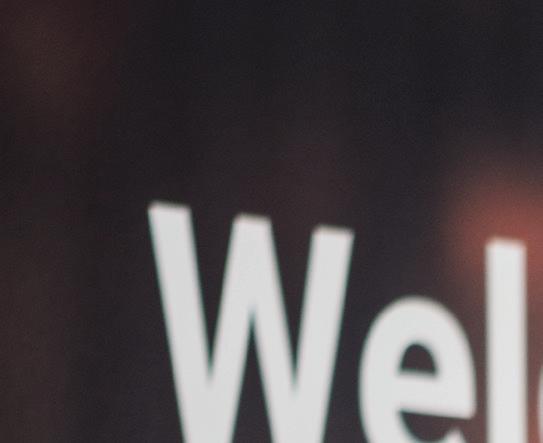

“By its nature, our borrowers are higher risk because the banks can’t fund them. But our remit is to help microenterprises that are struggling. Our role is about enterprise support and job creation and really, it’s about sustaining those small businesses that are so important to our economy.”
“A large proportion of the businesses we support are looking to access finance between €30,000 and €40,000. The new legislation was something we had sought for a long time, so we’re delighted to be in a position where we can help a larger cohort of businesses.”
“We’ve worked hard to make the customer journey as easy as possible. Our new online application portal features a link to open banking, so applicants don’t have to go to the trouble of uploading their bank statements anymore. They can just give us access to their financial data and it’ll automatically be sent to us.”

















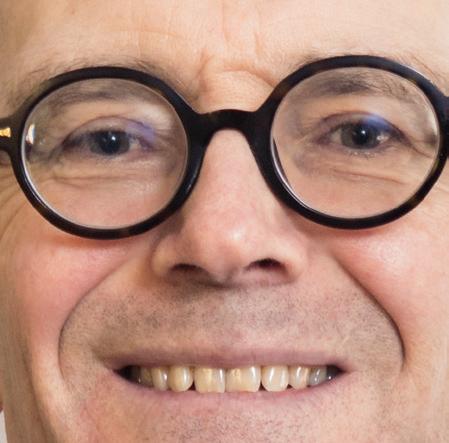
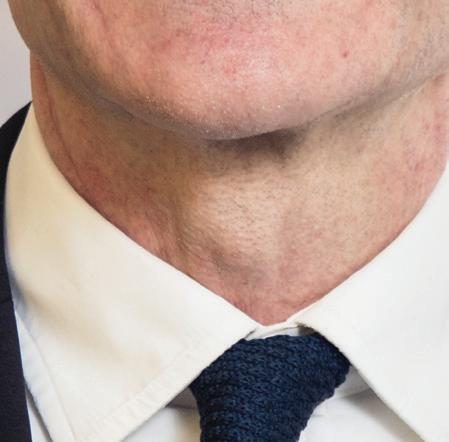
















CEO,
Ireland

Paul McCarthy
decisions on loan applications. MFI also works very closely with Local Enterprise O ces across Ireland, with about 35% of applications coming through LEO. Pre-application advisors or mentors are o en at hand in LEO’s to assist businesses with their application; the bene ts of that early stage assistance is re ected in the higher approval rate for LEO referrals. Both LEO and bank referrals bene t from a 1% discount to the interest rate for the duration of the loan.
Micro nance Ireland have also recently launched an online application portal.
“We’ve worked hard to make the customer journey as easy as possible. In 2023, MFI implemented a new IT system which has digitised the application process and taken all paper out of the process. Our new online application portal also features a link to open banking, so applicants don’t have to go to the trouble of uploading their bank statements anymore. ey can just give us access to their nancial data and it’ll automatically be sent to us.” at automation has also owed into MFI’s own back o ce processes, speeding up time to decision for applicants.

Businesses who are struggling should seek advice, initially from their LEO, says Des. “ e LEO’s are in a position to provide you with mentorships and information on any grants you may be entitled to. ere are so many resources out there and I would point businesses to the National Enterprise Hub to see what is available. e other piece of advice I would give is to really understand your numbers. Keeping on top of your nances is crucial and will see you in good stead when the business environment is tricky.”
Continuing to make the application process as simple as possible for customers is the goal going forward. “We also want to focus on increasing our lending to underrepresented groups such as female entrepreneurs, migrants, seniors, youths and people with disabilities. ese people are what we would call the ‘hidden entrepreneurs’, the ones that need the most help. at’s one of our key objectives and part of our strategic plan to 2027.”
For more information, visit MicroFinanceIreland.ie





eorgy Dillon’s path to becoming a renowned women’s tness expert specialising in pregnancy and postpartum exercise was shaped by her own struggles. “When I was pregnant with my rst daughter, I found it di cult to nd a trainer or even resources that t my work schedule,” she recalls. Working in property at the time, Georgy realised there was a signi cant gap in accessible and credible prenatal and postnatal training. “I wanted to create a hub of information and classes that mums could trust and access easily,” she says. Today, Georgy’s business thrives. She o ers online and in-person classes tailored for mothers. “It’s all about making exercise a manageable part of their lives,” she explains. Her classes focus on empowerment, ensuring mothers feel con dent in maintaining tness during pregnancy and beyond. Balancing business with family is no small feat, but Georgy’s routine is nely tuned. Mondays are devoted to clients, with live workouts and check-ins via her popular Instagram platform, @georgydillon_pt. Fridays, meanwhile, are business-focused, dedicated to nance, planning and continuing professional development. “ e days in between are a mix,” she notes, balancing client sessions with her own family responsibilities. “ ere are plenty of evenings when I log back in, too; it’s a constant juggle.”
Her secret to standing out in the competitive tness market is relatability. “As a mother of three, I understand the demands of family life and how it impacts tness,” Georgy explains. She focuses on realistic routines, eschewing quick xes for lasting habits. “ ere’s so much fearmongering about exercising during pregnancy. I lead with knowledge and empower mothers to feel con dent and strong.”
Technology has been a game-changer for her hybrid model. “Online classes o er accessibility and a ordability,” she says, adding that apps and platforms like Voxer help her maintain a strong client connection. Many clients appreciate the exibility, as they can choose between live sessions or recorded workouts, tting their needs.

For aspiring trainers, Georgy’s advice is simple: “Find a niche you’re passionate about and focus on that.” With her blend of expertise and lived experience, she’s a powerhouse in the tness world, helping mothers reclaim their strength and con dence. “It’s not just about tness; it’s about creating a supportive community for
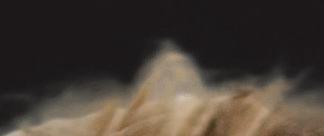




“IT’S NOT JUST ABOUT FITNESS; IT’S ABOUT CREATING A SUPPORTIVE COMMUNITY FOR MOTHERS.”








Hanna Nytomt’s tness philosophy is deeply rooted in the outdoors. “Training outside is second nature to me,” she says. When she moved to Ireland in 2006, she channelled her passion for tness into a career, completing her personal training quali cation at the National Training Centre. “I always knew I wanted to help people get t and healthy,” she says. By 2010, ShapeUp Fitness was born. Her journey from personal interest to a thriving business was driven by her deep belief in the bene ts of outdoor activity.
Hanna’s business model combines two unique niches: outdoor training and women’s tness. “Many women feel intimidated in gyms, so I created a safe and welcoming space,” she explains. Rain or shine, her clients train in the fresh air. “ ere’s something empowering about braving the elements,” she says. “Even on rainy days, my clients leave feeling accomplished.” Clients o en remark on the


“YOU’RE NOT JUST TRAINING BODIES; YOU’RE CHANGING LIVES.”





mental clarity and energy boost they gain from these sessions, reinforcing Hanna’s holistic wellness philosophy.
Social media has been instrumental in building her brand. “In the early days, we relied on yers and posters. Now, platforms like Instagram drive engagement,” she says. Her approachable style and genuine enthusiasm resonate with her audience. Covid brought challenges but also opportunities. “I resisted online classes initially, but they worked well,” she admits. While she’s returned to in-person training, she continues to o er online personal sessions, extending her reach. e hybrid model allows Hanna to connect with clients across Ireland and beyond, building a broader community of empowered women.
Hanna encourages aspiring trainers to follow their passion. “If you love helping people improve their lives, go for it,” she says. Her 13 years of success prove that you can build a thriving tness career with dedication and authenticity. “You’re not just training bodies; you’re changing lives,” she adds.



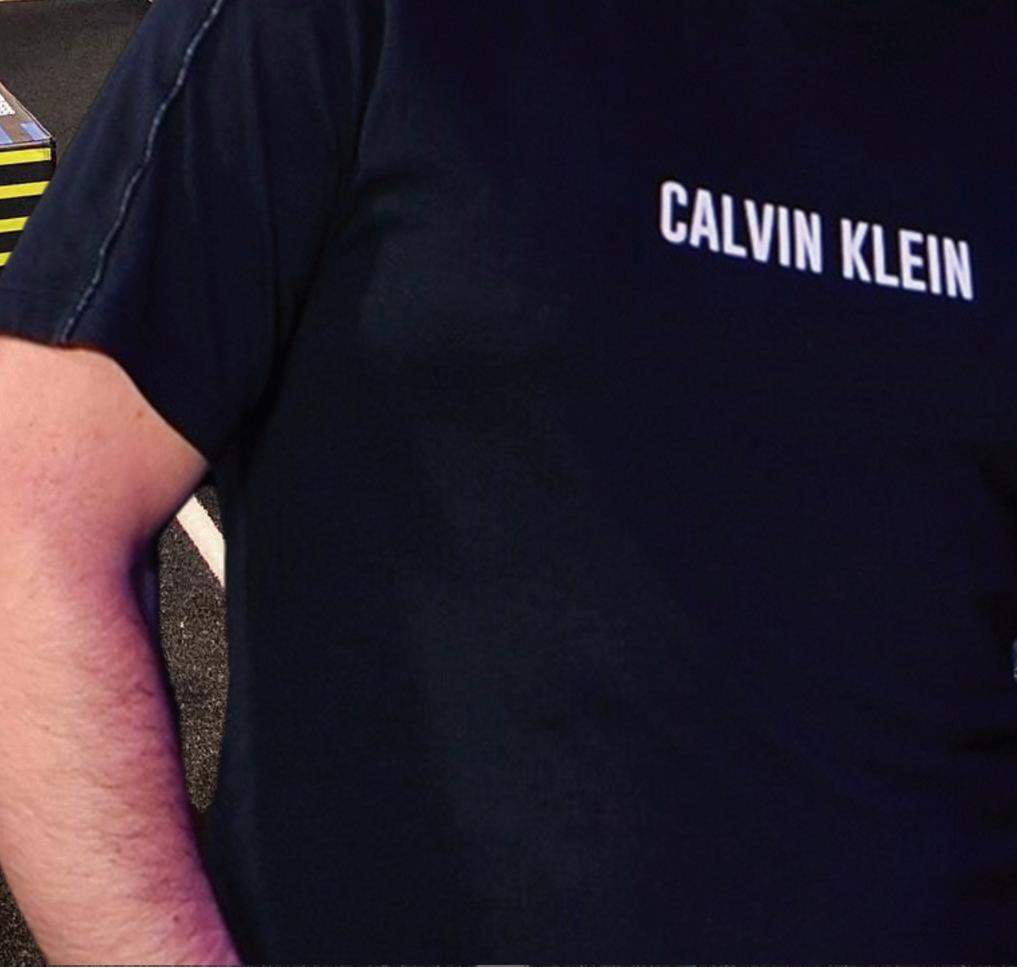
“UNDERSTAND YOUR MARKET AND HAVE A SOLID BUSINESS PLAN. IT’S ABOUT CREATING A SPACE WHERE PEOPLE FEEL INSPIRED TO REACH THEIR GOALS.”

Graham Cooley took a leap of faith, opening his rst gym in 2017. Inspired by a friend’s success with an Energie Fitness franchise, Graham was intrigued by the business model. “I joined as a member rst and saw the potential,” he explains. Four years later, he expanded with a second location in Dundalk. His decision to transition from hospitality to tness stemmed from a desire to build something tangible that combined his passion for service and community engagement.
e journey hasn’t been without challenges.
“Covid was the toughest,” he admits. “Everything shut down overnight and our new site had to be put on hold.” Navigating an unprecedented situation taught Graham resilience. “ ere was no one to lean on for advice, but we adapted and survived.”
Delivering top-tier service starts with building a strong team. “Systems are great for e ciency, but you need the right people to manage them,” he says. Retention is as critical as recruitment and community-building is at the heart of his approach.
“We want our members to feel supported, whether in the gym or at home,” Graham explains. Regular member engagement, from tailored workout plans to personal check-ins, ensures high satisfaction.
Technology plays a pivotal role, from wearables to CRM systems. “Our Boditrax machine provides detailed body composition analysis and our CRM lets us track member visits,” he says. “If someone hasn’t been in for a while, we reach out to help them get back on track.” Virtual classes and appbased resources also keep members connected, even when away from the gym.
Graham stresses the importance of research for those looking to start their own gym.
“Understand your market and have a solid business plan,” he advises. He emphasises nding the right location, understanding the community’s needs and creating a welcoming atmosphere. His dedication to quality and community has made his gyms stand out, even in a competitive market. “It’s about creating a space where people feel inspired to reach their goals,” he says.
Children’s

Project management is essential for any business aiming to drive growth, stay competitive and adapt to future challenges. At the heart of every successful project is a skilled project professional. Empowering project managers to master their roles allows them to perform effectively and grow confidently, giving the company assurance that projects are delivered to high standards. Here are five tips for businesses on how to support project managers and drive success.
We’ve all heard it before, but it can’t be emphasised enough that clear, straightforward communication is critical for any successful project. The quality of communication often determines the quality of the project outcomes. This doesn’t mean filling everyone’s schedule with countless meetings. Meetings should have clear objectives and outcomes to ensure they’re productive and everyone is aligned. Simple language is also key – avoid industry jargon that may confuse or alienate team members. Finally, remember that sometimes saying nothing is just as powerful as speaking. After all, what you say, or choose not to say, reveals a great deal about who you are.
A well-prepared project manager can make all the difference. Training project managers from the start – especially in core areas like planning, risk management and effective storytelling – equips them with the skills they need to handle projects confidently and independently. With proper support, project managers can follow company processes and maintain standards without constant oversight. Training also helps managers feel supported and empowered, which fosters a greater commitment to the company’s objectives and inspires trust within the team.
A SUCCESSFUL PROJECT NEEDS A COMPETENT PROJECT MANAGER. SINEAD GALLAGHER OFFERS FIVE TIPS ON HOW BEST TO
Challenges are inevitable on projects, but how teams approach them makes a big difference. Problem-solving can be stressful, especially when a project has been derailed and “turned red” (a project manager’s nightmare!) To ease this stress, encourage teams to view problem-solving as "finding the path back to green." This positive mindset focuses on identifying practical solutions and keeps the team working together toward a shared goal, rather than emphasising mistakes. Remind teams that they can course-correct and getting back on track is always within reach.
Selecting the right tools isn’t just about ticking a box – it’s about providing project professionals with resources that save time, streamline tasks and support data-driven decisions. Today, numerous tools are available for businesses and professionals to enhance the efficiency of project management, so companies should properly evaluate solutions before investing to ensure they are userfriendly and add real value.
Clearly defined project objectives that align with broader business goals are essential for driving success. Establishing expectations and key performance indicators (KPIs) from the outset provides measurable benchmarks to guide the team’s efforts and reinforces how their work contributes to the company’s mission. By working backwards from the end goal, teams can identify the necessary steps for success and understand the project's value. This approach is a powerful reminder during challenging times, helping the team stay focused and committed to achieving their – and the organisation’s – objectives.
e Gender Pay Gap is well documented in Ireland, particularly since compulsory Gender Pay Gap reporting was introduced in 2021. e Gender Pension Gap receives less attention, yet its rami cations are far-reaching. Earlier this year, AIB commissioned a paper entitled ‘Closing the Gender Pension Gap’, created in collaboration with e Future Laboratory. It maps out the milestones and contributing factors that will likely see the end of Gender Pension Gap in Ireland by 2050.
A woman retiring today in Ireland has a retirement income 31% less than her male counterpart. Women are on average less likely to make additional contributions to their pensions because they don’t have spare money to do so or because if they do have extra cash, their pension isn’t top of the list. All this means that women have less going into their pension pots than men.
THE GOOD NEWS? GENDER PENSION GAP IN IRELAND SET TO CLOSE BY 2050
But things are changing. anks to a series of key policies and seismic social shi s taking place in Ireland, the Gender Pension Gap is not just on the decline, but it could well close entirely by 2050. Particularly impactful is the planned introduction of auto pension enrolment next year in Ireland, which will not only bump up female participation but will also raise awareness about the importance of planning for retirement. Within the next 25 years, the expectation is that the Gender Pay Gap and associated Gender Pension Gap will become a thing of the past, meaning a woman will likely retire with an equal pension to that of her male colleague. In tandem with the systemic forces at play to close the Gender Pay Gap, over the next decades we will see the rise of four trends accelerating and augmenting the closure of the Gender Pension Gap, with each generation of Irish women playing their role to drive the change:
Youth Premium – e Equality Ultimatum
Rethinking Work – e Agile Working Default Diversity as the USP – Accelerated by AI e Great Wealth Transfer – Female Investors Rising




– THE EQUALITY ULTIMATUM
In the second quarter of 2024, Ireland hit an employment rate of 74.4%, the highest ever recorded. Because of demographic shi s and fewer young people relative to older generations, this trend will increase. Tight labour markets will give Irish Gen Zs considerably more bargaining power than older cohorts. What this means is work isn’t going to feel like business as usual and with that will come dramatic culture change in favour of women, as they actively address any sense of inequality that they experience in their employment, helping to close that gender pension gap. What employers are starting to realise is that Gen Z see employment as a right, not a privilege.
– THE AGILE WORKING DEFAULT
In the future, we will talk less about where the work is done and more on how it is executed. e workforce will grow increasingly skilled at adapting collaborative tasks to certain environments and working independently to one another. It’s these workplace practices which feel experimental today that will become second nature and widespread over the coming decades and that is why full-time work will no longer just be for certain people, but instead accessible to all, women and men.
DIVERSITY AS THE USP
– ACCELERATED BY AI
AI is the next workplace shake-up on the horizon and it’s going to make diversity even more of an asset than it is today. In a world where the computers will be trained to cover standard, repetitive tasks, companies will have to hone their ability to think di erently, to come up with out-of-the-box ideas.
Closing the Pension Gender Gap requires innovative pension policies such as pension credits, additional top-up directives after career breaks or the option of a benefits menu from which women can, for example, choose to scrap free gym membership if they’d rather increase pension contributions. Organisations might look to nudge women to prioritise additional voluntary contributions to top-up their pension as they scale the pay ladder.
at won’t come from a workforce that looks identical. As the impact of AI takes hold into the early 2030s, women will be among those to bene t, particularly in areas where they are in the minority.
Women are demanding new products, services and platforms that make nancial planning more accessible and relevant to their needs. Already, digital products o er women engaging ways to think about their nancial futures and plan for retirement. Over the next 10 years, Gen X and Millennial children will inherit wealth assets from their Boomer parents who have accrued unprecedented wealth. Financially savvy females will look ahead to their 100+ year lifespan projection and approach investment with careful thought, looking for ways to build nancially stable futures, top-up their pensions and close not only the Gender Pension Gap, but the gender investment gap too.
Increased awareness of the Gender Pension Gap will drive women to seek good nancial advice to provide them with guidance on what they can do to close the gap. Additional Voluntary Contributions to top-up their pensions and wider nancial planning strategies will support women in actively managing their nancial security in retirement. But this can’t just be le to the individual. While closure of the Gender Pension Gap is within reach, it still requires coordinated interventions across departments, organisations, policy makers and nancial institutions too.
2050 can’t come soon enough.
Employees across the organisation will have di erent needs. Leaders must recognise that parenthood isn’t the only obstacle to career advancement and pay parity. In order to unearth each individual’s set of needs, managers need to be coached to ask the right questions and gather feedback from the team. Only then can they co-create strategies to overcome barriers on an individual basis with their sta .
While female networks are great to o er support and advice, the benefits of equality in the workplace create a culture of fairness that benefits all employees. A future where women are equally represented and where they retire with as much financial security as men, will be a reflection of a workplace culture that ultimately benefits through increased diversity of thought.


















AN EVER-INCREASING ADMIN BURDEN AND REQUIREMENTS AROUND REPORTING ARE TAKING THEIR TOLL ON SMALL FIRMS. CATHERINE MCGOVERN, TAX PARTNER AT AZETS IRELAND, DISCUSSES SOME OF THE ISSUES IMPACTING IRELAND’S SMALL BUSINESS COMMUNITY
























For every business, regardless of industry or size, sta retention is one of the most pressing issues. To try and retain sta , employers provide small bene ts to team members through the Small Bene t Exemption Scheme. Previously, employers could give €1,000 per employee every year tax-free but from January 2025, that gure increased to €1,500 per employee annually and can include up to ve non-cash bene ts per year. Good news, but the introduction of Enhanced Reporting Requirements (ERR) has muddied the waters somewhat.
“ ese new rules require employers to report three categories of non-taxable payments on a real-time basis. ese categories include travel and subsistence, remote working allowance and small bene ts exemption. ERR came into e ect on 1 January 2024 and since then, it has highlighted the di erence between what an employer sees as a small bene t and what Revenue considers a small bene t,” says Catherine McGovern, Tax Partner at Azets Ireland. Any small bene t, the classic example being a rewards voucher but it can also stretch to an Easter Egg, is classed as a small bene t, according to Revenue. “ at means a voucher and something quite small like an Easter Egg would amount to two bene ts. e interpretation of what small bene ts actually are has caused a considerable amount of confusion since the introduction of ERR. Employers are coming to us to ask, if I give my sta member a bunch of owers when she’s going on maternity leave, does that count as a small bene t? Sta retention is a key challenge for employers and small bene ts are an e ective way of recognising employees. Moving forward, I think it is key that there is more more practicality and commerciality around this issue. In addition, ERR has also placed additional compliance expenses on businesses already grappling with rising businesses costs. is is an issue that will continue to impact employers if it’s not dealt with.”
Employers are, says Catherine, also utilising other methods by which to retain their sta . Many are o ering share awards to sta members or providing employer pension contributions, while employers are being much more exible when it comes to where sta members want to work. “We’re seeing employees who want to perhaps work in Ireland a couple of days a week and travel back to a di erent jurisdiction for the remainder of the week. Employers don’t want to lose their sta and so will accommodate these types of requests, which require considerable tax advice to make them work. In these cases, employers will need advice around employment tax but they also need to consider if dual jurisdiction requires a corporation tax permit establishment in the other jurisdiction. ere are numerous issues to consider in order to make this situation tenable, but it’s happening all over the country as employers want to keep their sta .”

Measures introduced in Budget 2025 will, says Government, reduce the administrative burden on business. However, similar claims made in Budget 2024 failed to materialise, with employers citing the burden of administrative tasks as one that takes away from growth and innovation. The recently published Eurochambres Economic Survey, which included findings from Irish businesses, showed a striking rise in regulatory burden across the board. The report found that most newly imposed admin costs are associated with ESG regulations under the European Green Deal, which will impose almost €2 billion in additional burdens on both businesses and citizens. Reporting requirements under the EU’s sustainability reporting and due diligence framework are also proving adding to the Irish businesses administrative burden. Small businesses that lack the resources to coste ectively deal with regulatory compliance are often hit hardest.
“Employers are telling us that administrative burden is becoming increasingly challenging. The introduction of PAYE Modernisation a few years ago significantly increased the admin burden on employers and ERR has further added to that. The introduction of ‘Making Tax Digital’ over the next few years, which will require an increased level of real-time reporting around invoicing, will also place added strain on time-poor businesses struggling to deal with a myriad of challenges,” says Catherine.
The cost of doing business
In 2024, the SFA’s ‘Cost of doing Business’ survey found that: 83% of small businesses have experienced a rise in business costs
1 in 3 businesses expect to run out of liquidity without financial aid
57% reported an increase in labour costs
32% stated rising costs as the biggest challenge
57% say that labour costs have contributed to rising costs
51% say energy costs have risen in the past year
45%
say insurance costs have contributed to overall rising costs
37%
cited an increase in raw material costs
3/4 would like to see the government do more to help small businesses get access the financing they need
While issues concerning housing and the cost-of-living dominated debates and discussions during the recent General Election campaign, issues concerning business costs did feature at times. Each political party made various commitments to assist small businesses in their respective manifestos.
The Labour Party promised, if elected to Government, to provide scale up financing through a new Strategic Investment and Development Bank and develop a community banking model for SME lending. The Social Democrats stated that the next Government needs to rebalance its focus towards driving innovation in domestic SMEs to close the productivity gap with multinationals.
Both Fine Gael and Sinn Fein have promised a temporary PRSI Rebate for small businesses while Fianna Fáil promised to reduce, by 1.5%, the rate of employers’ PRSI on minimum wage workers.
During the campaign, Ibec hosted an election hustings featuring key business spokespeople from most major political parties. The event gave the parties an opportunity to put forward their own proposals on how their policies would benefit the business community. The representatives at the hustings were Peter Burke from Fine Gael, Ged Nash from Labour, Eoin Hayes from the Social Democrats, Dara Calleary from Fianna Fáil and Louise O’Reilly from Sinn Fein. Much of the discussion focused on the concerns of small businesses. In response to a question from the Small Firms Association, all parties committed to enacting their respective programmes to help small businesses within a few months of taking office if elected to Government.
At the time of writing, the Programme for Government was being negotiated by Fianna Fail who won 48 seats, Fine Gael who won 38 seats and various independent TDs.





After months of elections, selections, political manoeuvring and parliamentary scrutiny, the new European Commission took o ce
Ursula von der Leyen was re-elected for a second mandate to lead a new College of Commissioners to deliver the 2024-2029 work programme. It is expected that the new Commission will focus on business competitiveness over the next five years.
The Commission has committed to focus on introducing a ‘Competitiveness Compass’ to close the innovation gap in certain sectors. The Commission also wants to boost productivity with digital tech diffusion to strengthen Europe’s competitiveness and become a global leader in AI innovation. Among other issues, the Commission wants to tackle the skills and labour gaps to improve people’s careers and economic competitiveness.
Geraldine Magnier has secured a second term as SFA Chairperson
Geraldine Magnier, CEO of Idiro Analytics, an advanced analytics company, has been re-elected to serve a second two-year term as the Chairperson of the Small Firms Association (SFA). After serving two successful years as Chair of the SFA, Geraldine was re-elected by her peers on the SFA Council and members present at our Annual General Meeting which took place in November. Addressing delegates at the AGM, Geraldine said: "When asked if I'd stand again for election, I said yes, because it's an honour to serve the small businesses of Ireland and despite a challenging environment right now, there is nothing more rewarding than working in a progressive environment where the people are open to solution-making and creating meaningful change to benefit small businesses. That's exactly what being part of the SFA means to me and our members.”
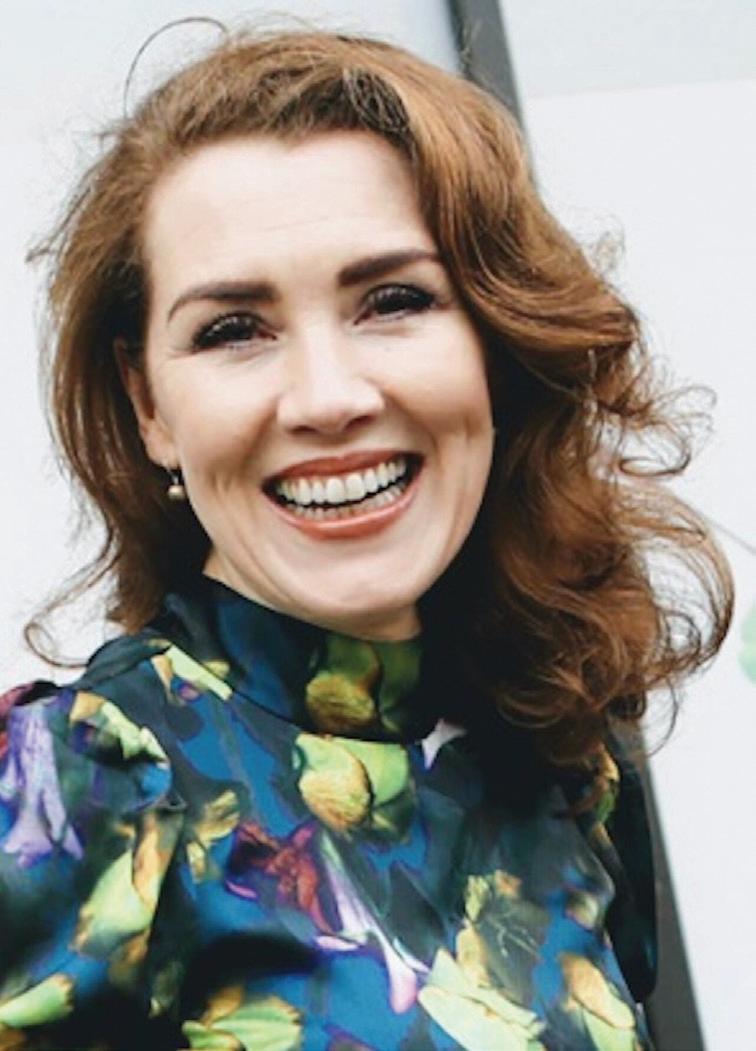
“WHEN ASKED IF I'D STAND AGAIN FOR ELECTION, I SAID YES, BECAUSE IT'S AN HONOUR TO SERVE THE SMALL BUSINESSES OF IRELAND.”
National Minimum Wage rises, again!
From the 1st of January 2025, the National Minium Wage (NMW) will rise by 80 cent to €13.50 per hour. The scheduled increase was announced by Minister for Finance Jack Chambers for Budget 2025. The increase also sees an increase in the sub-minimum wage rates, which will see workers under the age of 18 on the NMW rate rise to €9.45 per hour, 18-year-olds will be on a rate of €10.80 per hour while 19 years olds will be on the rate of €12.15 per hour











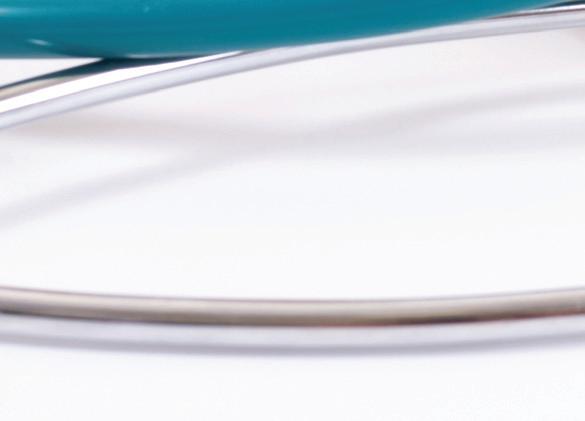










WITH STATUTORY SICK PAY AND SICK LEAVE ENTITLEMENT DAYS ON THE UP IN 2025, SFA HR EXECUTIVE ZAYNAB LAWAL TAKES A LOOK AT WHAT EMPLOYERS NEED TO BE MINDFUL OF


tatutory Sick Leave and Sick Pay commenced on the 1st of January 2023 following the introduction of the Statutory Sick Leave Act 2022. ree days of entitlement were permitted in the 2023 calendar year. In 2024, employees are entitled to ve days of statutory sick pay (SSP) per year. e Government intends to increase statutory sick days to seven calendar days in 2025 and potentially, 10 days per calendar year in 2026.
Section 5 of the Statutory Sick Leave Act 2022 sets out that an employee must have completed 13 weeks of continuous service with their employer to qualify for sick pay. An employee must produce a medical certificate in order to qualify for Statutory Sick Leave. The medical certificate must be in the official language of the State and signed by a registered medical practitioner. Significantly, it must state that the employee is unfit to work. The medical certificate should cover each day that the employee is sick in order for the employee to receive payment. The medical certificate should be from the first day of sickness. Sick pay is payable only on days that the employee is scheduled to be at work.
The Act provides that an employer must pay an employee in respect of each Statutory Sick Day. The Act sets out the prescribed daily rate for Sick Leave. Sick Pay is paid at 70% of the employee's normal daily pay, up to a maximum of €110 per day.
There are two methods for calculating the average gross earnings, depending on whether the employee earns a fixed wage or salary or works variable hours. If an employee is not a salaried worker or works variable hours, a reference period of the preceding 13 weeks, multiplied by the number of hours an employee would have worked if they were not out sick, can be used for the calculation.
An employer must maintain a record of all statutory sick leave taken. These records include:
The period of employment of each employee who availed of statutory sick leave
The dates and times of statutory sick leave in respect of each employee who availed of such leave
The rate of statutory sick leave payment in relation to each employee who availed of statutory sick leave.
Records must be retained for four years. Employers who, without reasonable cause, fail to comply shall be guilty of an offence and liable to a fine of up to €2,500.
As the entitlement to Statutory Sick Pay increases, employers should refer to their statutory sick pay scheme to check if it is still deemed more favourable
If an employer is relying on Section 9 of the Act, best practice would be to outline in your company sick pay scheme policy that the company sick pay scheme will continue to apply
Ensure records are up to date and secure.
Section 9 of the Act states that if an employer provides a more favourable scheme to employees as a whole, the obligations of the Statutory Sick Pay scheme shall not apply. In determining whether a sick pay scheme confers benefits that are more favourable as a whole, the Act requires five criteria to be considered.
THE FIVE CRITERIA ARE OUTLINED AS FOLLOWS:
1. The period of service that an employee must have before sick leave is paid
2. The number of waiting days
3. The duration of sick leave paid
4. The amount of sick pay
5. The reference period used for pay calculation
Employees can bring a claim to the Workplace Relations Commission (WRC) if they believe the employer’s scheme is not more favourable and that they are entitled to statutory sick pay.




Asthe days get shorter and the mornings darker, many of us feel the creeping weight of low energy and mood. For some, it’s more than just winter blues; it’s Seasonal Affective Disorder (SAD), depression symptoms linked to the change in seasons. Already balancing countless responsibilities, small business owners may find these winter challenges particularly tough to manage – both for themselves and their teams.
SAD is thought to be triggered by reduced exposure to sunlight. This disruption to our body’s internal clock can lower serotonin levels (the hormone that helps regulate mood) and affect melatonin (the hormone that regulates sleep). Symptoms vary but often include irritability, tiredness, difficulty concentrating, oversleeping or withdrawing socially. In business terms, it’s like running on a low battery when you need to be at full charge.
FIVE LEARNINGS FROM THE NORDICS
In Nordic countries, where winter days can be as short as four hours, people have found ways to thrive despite the darkness. As someone from Iceland, I’ve seen how we adapt by prioritising wellbeing, light exposure and a sense of community. Nordic workplaces are known for their innovative approach to mental health, from offering flexible work arrangements to providing access to professional help.
One simple yet effective practice is light therapy. Unique lamps that mimic natural daylight help reset the body’s internal clock and improve mood. At Kara Connect, where we support workplaces with mental health solutions, I’ve seen how even small wellbeing habits can lead to significant changes.
Winter doesn’t have to bring everything to a halt. By making minor adjustments inspired by the Nordics and prioritising mental health, you can support yourself and your team to thrive and be happier. Brighter days are always ahead. With the right tools, you can navigate the season with resilience and optimism.
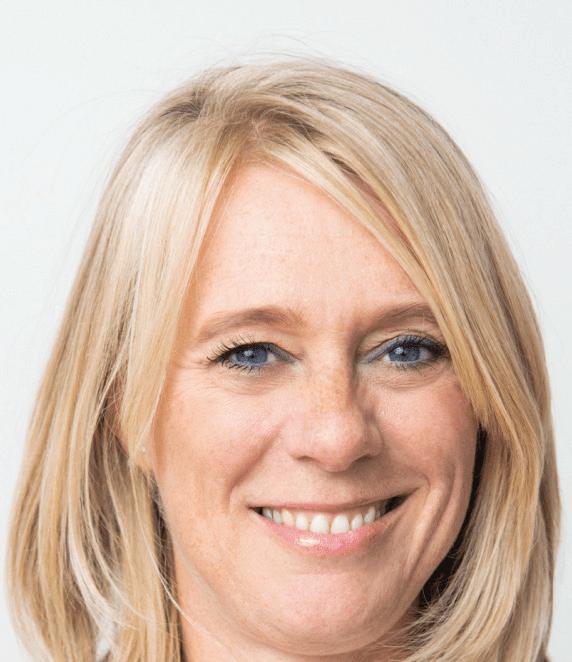
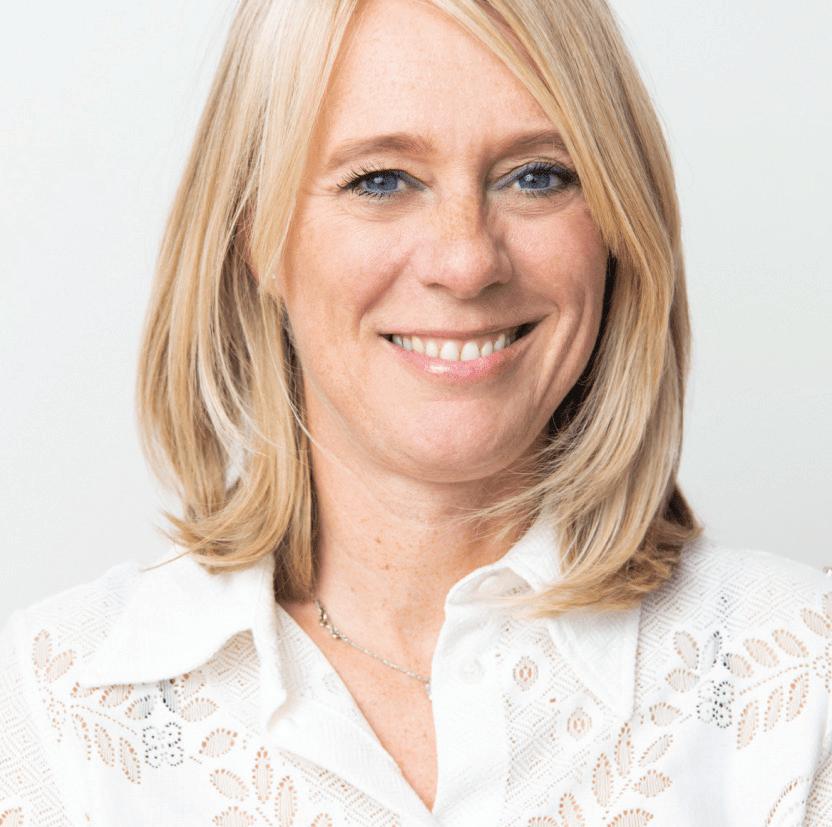
1. LOOK INTO THE LIGHT!
Increasing exposure to bright light into your eyes can ease SAD symptoms. Offer your employees the opportunity to use a light therapy lamp for 15 minutes each day. Encourage outdoor breaks and walks during daylight hours, even just for a quick coffee.
2. KEEP MOVING:
Physical activity boosts endorphins – the feel-good hormones that help counter low moods. Try starting a lunchtime walking group or sharing simple indoor workout ideas with your team.
3. CREATE A SUPPORTIVE CULTURE:
Open up conversations about mental health. Let your team know it’s okay to seek help and provide access to resources like counselling. A solution like Kara Connect Wellbeing Hubs allows employees to book confidential 1:1 sessions with qualified professionals.
4. WARM INITIATIVES:
Create a warm and inviting workspace. It could include soft lighting, comfortable seating but also a tea corner with new flavours and ginger snaps. Sitting down with a co-worker can save the day.
5. REMEMBERING INDIVIDUAL DIFFERENCES:
It is important to remember that SAD can affect people differently. On a nice summer day a communication problem might not turn into anything, but when an employee is affected by SAD things can get harder.
6. DISCUSS SLEEPING PATTERNS: You would not believe it, but we need about 1-2 hours more sleep in the dark. Just discussing that in your team might lead to some valuable tips and tricks.
DAVID CASEY TAKES A LOOK AT SOME OF THE TRENDS EXPECTED TO IMPROVE EMPLOYEE WELLNESS IN 2025
Organisations that wish to attract and retain talent must implement workforce wellness programs, which are no longer merely desirable, as 2025 approaches. Enhancing company culture, reducing healthcare costs and increasing productivity necessitates prioritising employee health and wellness.
Nevertheless, the wellness programs of 2025 will be significantly di erent from those of today.
We will explore the most significant trends that will revolutionise employee wellness in the upcoming year, enabling organisations to adapt to the changing requirements and expectations of their workforce.
Organisations will employ data analytics and artificial intelligence from many benefit and insurance providers to develop customised wellness programs that assess health risks and anticipate probable health concerns. The wellness model that is one-size-fits-all is no longer e ective, as employees have a wide range of requirements. Organisations can now collect data on employee health metrics, work routines, stress levels and preferences as a result of advancements in AI and machine learning. This information can be employed to customise wellness recommendations, including those for stress management, nutrition, dental, overall health, exercise and mental health resources, to ensure that employees receive support that is truly tailored to their individual requirements.
Organisations will enhance work-life balance by establishing work hour limits, instituting technology regulations and polices, and motivating employees to utilise their yearly leave. Discomfort can adversely a ect productivity and engagement; therefore, business will prioritise the establishment of welldesigned, ergonomic o ces, innovation hubs and shared open o ce spaces.
“Hoteling” in the workplace refers to a system where employees reserve desks or workspaces on an as-needed basis, similar to booking a hotel room, rather
than having a fixed assigned desk, allowing them to choose the most suitable space based on the tasks they need to complete, maximising o ce space utilisation and catering to flexible work schedules
Wearable technologies and biometric feedback will enable businesses to assess and enhance employee wellness at an individual level by running competitions such as 5km walks and runs and getting the employee to send a copy of the step count from these applications. Organisations will promote frequent exercise and walking among employees, as these activities can enhance mood, alleviate stress and boost cognitive function.

“ENHANCING COMPANY CULTURE, REDUCING HEALTHCARE COSTS AND INCREASING PRODUCTIVITY NECESSITATES PRIORITISING EMPLOYEE HEALTH AND WELLNESS. ”
Mental health has become an increasingly significant aspect of workplace wellness and it will become even more critical by 2025. Although there has been an increase in awareness of mental health in recent years, tension, anxiety and burnout continue to be substantial concerns in the workplace. Companies are responding by increasing their investment in comprehensive mental health resources including resiliencebuilding seminars, digital mindfulness tools and virtual therapy sessions. Mental health will be a primary emphasis, with more workplaces providing programs aimed at social connection and financial wellbeing. Mental health training and mental health first aid continue to be a high priority. Training in psychological safety across teams is a crucial enhancement for businesses to achieve optimal innovation, creativity and productivity.
PROGRAMS FOR SLEEP ASSISTANCE
Organisations will provide sleep advice as a component of an Employee Assistance Program and via workshops as a key pillar to wellbeing.
AWARENESS OF HORMONAL HEALTH
Individuals will understand the significance of hormonal health in metabolism, energy, mood and sleep, while companies will provide programs to enhance hormonal equilibrium.
David Casey is DeCare’s Head of Head Promotion and a Doctorate Candidate of Trinity College Dublin. Find out more about our dental, vision and wellness programs at decare.ie
DeCare is at the forefront of the industry as companies continue to prioritise employee wellness in 2025, establishing new standards in holistic and accessible wellness programs. Our innovative approach o ers a comprehensive selection of wellness programs, as well as a variety of benefits in both oral and optical health
YOUR BUSINESS WITH FET
Local businesses all over Ireland can take advantage of highly subsided, fully accredited training to help future-proof their organisations. Further Education and Training (FET) programmes, developed under the Skills to Advance initiative, offer employees and employers targeted, flexible upskilling opportunities, all at little or no cost.
While employment is at a record high in Ireland and new industries are emerging, there is clear evidence of the need for significant upskilling and reskilling across the workforce. New national and EU policies, advances in technology, and employment growth are all changing the job role requirements of already-established professions. For example, the 2024 National Skills Bulletin found that many accounting and finance professionals are having to upskill to meet the changes in their job profile, brought on by things like environmental, social and governance (ESG) criteria and corporate social responsibility (CSR) reporting requirements.
The Skills to Advance initiative was launched by SOLAS, the Further Education and Training authority, in 2018. The initiative assists employers to develop new skills in their teams, improve processes and cost savings, and increase their competitiveness through highly subsidised training. All FET microqualifications available through Skills to Advance programmes are designed collaboratively by SOLAS, the 16 Education and Training Boards (ETBs) around Ireland, and industry partners to ensure employees receive the most targeted, relevant upskilling.
Skills to Advance courses are delivered locally by your ETB. Course content is delivered in online, inperson, and blended learning formats, with tutor support and online digital resources to enhance the learning experience. Programme delivery is

designed to be flexible and is scheduled to fit around the operating needs of the business. There is a varied range of courses available, from healthcare and hospitality to digital skills, sustainability, and more.
Included in the Skills to Advance offering are new FET micro-qualifications - bite-sized, accredited programmes that deliver targeted training in rapidly transforming skill areas. To deliver on value and accessibility, FET micro-qualification courses are highly subsidised, delivered flexibly, and short in duration - amounting to around 50 hours of tutor and self-directed learning combined.
FET micro-qualification are available now in priority skill areas, such as digital business skills, green/sustainability skills, business innovation, market development, robotics and more. New programmes are currently in
development to target other emerging skill areas such as Artificial Intelligence (AI) and Corporate Sustainability reporting. These FET micro-qualifications and more will launch in 2025. They will be available through the network of local ETBs nationwide.
Since 2019, over 89,000 training opportunities have been availed of under Skills to Advance, with around one-third of by these employees already with a qualification. These programmes are a fantastic opportunity to upskill and reskill for career development within companies, as well as empowering business owners and employees with the skills needed to create more agile, competitive, and profitable companies.
Contact your local ETB today to find out what Skills to Advance courses are available in your area or find out more about the initiative at www.skillstoadvance.ie
“THE INITIATIVE ASSISTS EMPLOYERS TO DEVELOP NEW SKILLS IN THEIR TEAMS, IMPROVE PROCESSES AND COST SAVINGS, AND INCREASE THEIR COMPETITIVENESS THROUGH HIGHLY SUBSIDISED TRAINING.”
As we look ahead to 2025, it’s important to review 2024 and see where you can start making improvements with your employee rewards programme. Did you know, as part of the recent budget announcements, as a business owner, you can now gift an employee up to €1,500 tax-free?
Terry Spence, Director of Sales at One4all Rewards states: “A significant development for business owners comes into effect on January 1st through benefit-in-kind (BIK), which might just be the answer to bolstering employee morale and loyalty.” You can now gift an employee up to €1,500 tax-free, thanks to the increase in the BIK limit to €1,500. This change allows businesses to reward their employees with up to €1,500 per annum in One4all Gift Cards, exempt from tax, PRSI, and USC charges, potentially saving up to €1,980.68* per employee. The maximum reward of €1,500 can be split across five payments in one financial year.
This is the perfect scheme to utilise as part of your 2025 rewards programme. The flexibility of splitting this benefit across five payments in the calendar year opens the door to so many more rewarding opportunities. Terry says: “Recognising colleagues throughout the year is crucial for creating a positive work environment.” Here are a few occasions worthy of acknowledgment that your business can start to incorporate into your rewards and recognition programme:
• Employee Milestones:
Celebrate years of dedicated service and personal achievements, reinforcing loyalty and commitment.
• Meeting or Surpassing Targets: Acknowledge individual and team accomplishments, fostering a culture of excellence and productivity.
• Team Motivation or General Recognition:
Inspire collaboration and camaraderie through acknowledging collective efforts and positive contributions.
• Birthdays:
Make individuals feel valued and appreciated on their special day, strengthening workplace relationships.
• Maternity/Paternity Leave:
Show support and gratitude for lifechanging events, emphasising worklife balance.
• Long-Service:
Honor dedication and loyalty, recognising the enduring contributions of long-term employees.
• Retirement:
Bid farewell with gratitude and appreciation, celebrating a career’s worth of achievements and memories.
The popular One4all Gift Card is a perfect reward and can be loaded from €15 to €150 and its digital counterpart can be tailored with a personalised video message from you on behalf of your business or customised with an image of your company logo, easily sent by text or email. For higher value loads over €150, the One4all Chip & PIN Gift Card is a great option. Payments can be made contactless and the card comes in a physical or a digital reloadable format. EU Directives to protect Irish consumers means anonymous gift cards with a load value of over €150 currently require a simple photo verification process to help protect Irish consumers against online fraud. Employees who have already received a Chip & PIN Gift Card benefit from previous photo verification, meaning the ID process is still valid for a period of up to four years from initial verification.

Terry Spence, Director of Sales, One4all Rewards
Something One4all are proud of is when you choose One4all Gift Cards, you’re not just rewarding your employees, you’re also supporting Irish retail. The closed-loop gift card system ensures that the funds can only be spent in Ireland through Irish retailers which helps boost the local economy and is great for Irish jobs. Terry says: “When you reward with a One4all Gift Card this year, you’re giving the gift of choice with access to thousands of outlets nationwide and participating online retailers. You can select from big brands, as well as options for travel, dining, and experiences delivering amazing value.”
For more information, email rewards@ one4all.ie or visit www.one4allrewards. ie to place your order today
*Figure of €1,980.68 is based on giving €1,500 net to an employee on the 40% tax band paying full PRSI and USC










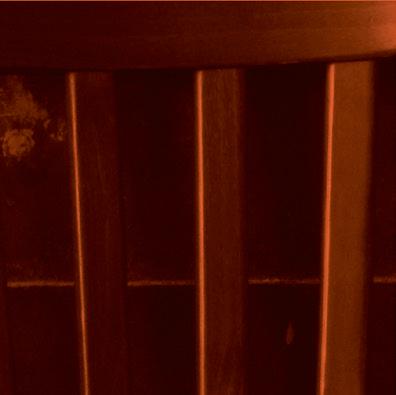
EALAÍN NA GAELTACHTA SUPPORTS THE ARTS AND ARTISTS IN IRISH LANGUAGE AREAS ACROSS THE COUNTRY. ITS NEW CEO, RACHEL HOLSTEAD, SPEAKS TO DEANNA O’CONNOR ABOUT THE NEW ROLE AND HOW SHE PLANS TO MAKE A DIFFERENCE
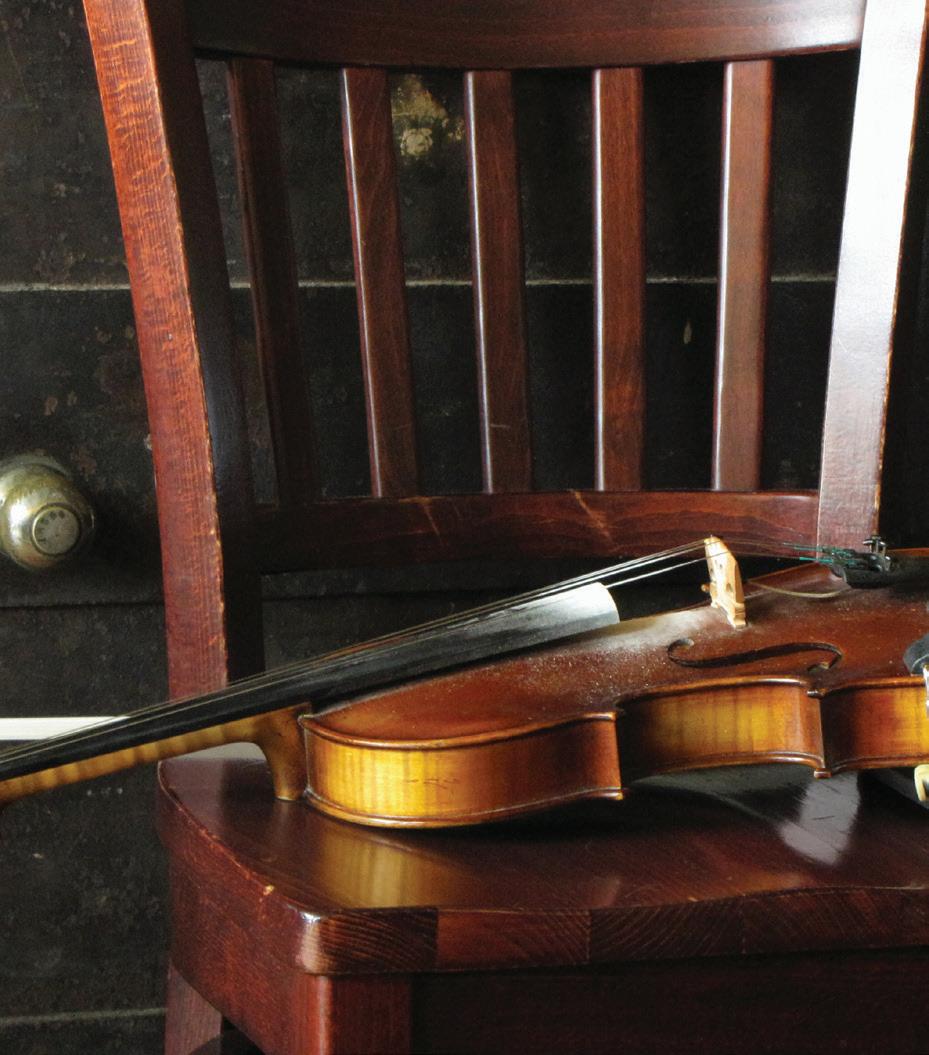






Ireland’s Gaeltacht areas are the strongholds of our native language, traditional music and culture.
Protecting and nurturing the economic, social and cultural development of the Gaeltacht areas has been the responsibility of Údarás na Gaeltachta since 1980 and in 1997, Ealaín na Gaeltachta was founded as a partnership with e Arts Council, with a mission to develop both contemporary and traditional arts in the Gaeltacht. Its remit covers the development and support of arts across all the Gaeltacht –Donegal, Mayo, Galway, Kerry, Cork, Meath and Waterford, encompassing six inhabited islands. With a population of under 100,000 in Gaeltacht areas recorded in the 2016 census, the organisation is presented with a unique set of challenges with such a wide geographical distribution, serviced by only a few o cial arts centres.
e Ealaín na Gaeltachta team clock a lot of miles, covering their territories, but tend to come together in Galway as a meeting point. It’s a small organisation – with just nine sta currently and a new part-time communications position, which will bring it up to 10. Rachel Holstead has been with Ealaín na Gaeltachta since 2017 and in June of this year took up the role of chief executive.

Before that, she was proud to be called an ‘áisitheoir’ – a facilitator – with the organisation. Holstead points out that the job description ‘áisitheoir’ has much more pleasant connotations than ‘oi geach’ or o cer and is more indicative of how the organisation operates – facilitating and supporting. “Our job is to make people’s lives easier, not to o ciate over them or to be in charge of them.” eir ethos is very much “How can we help? How can we support?”
e services and grant schemes provided by Ealaín na Gaeltachta support both arts organisations –festivals, projects and venues – and individual artists. Holstead was born in the Corca Dhuibhne Gaeltacht, to English parents. Her father is an artist, her mother a piano teacher. ey didn’t have Irish at home but as young children do, they picked it up quickly when surrounded by the language at school. “When my sister and I were little, it was our secret



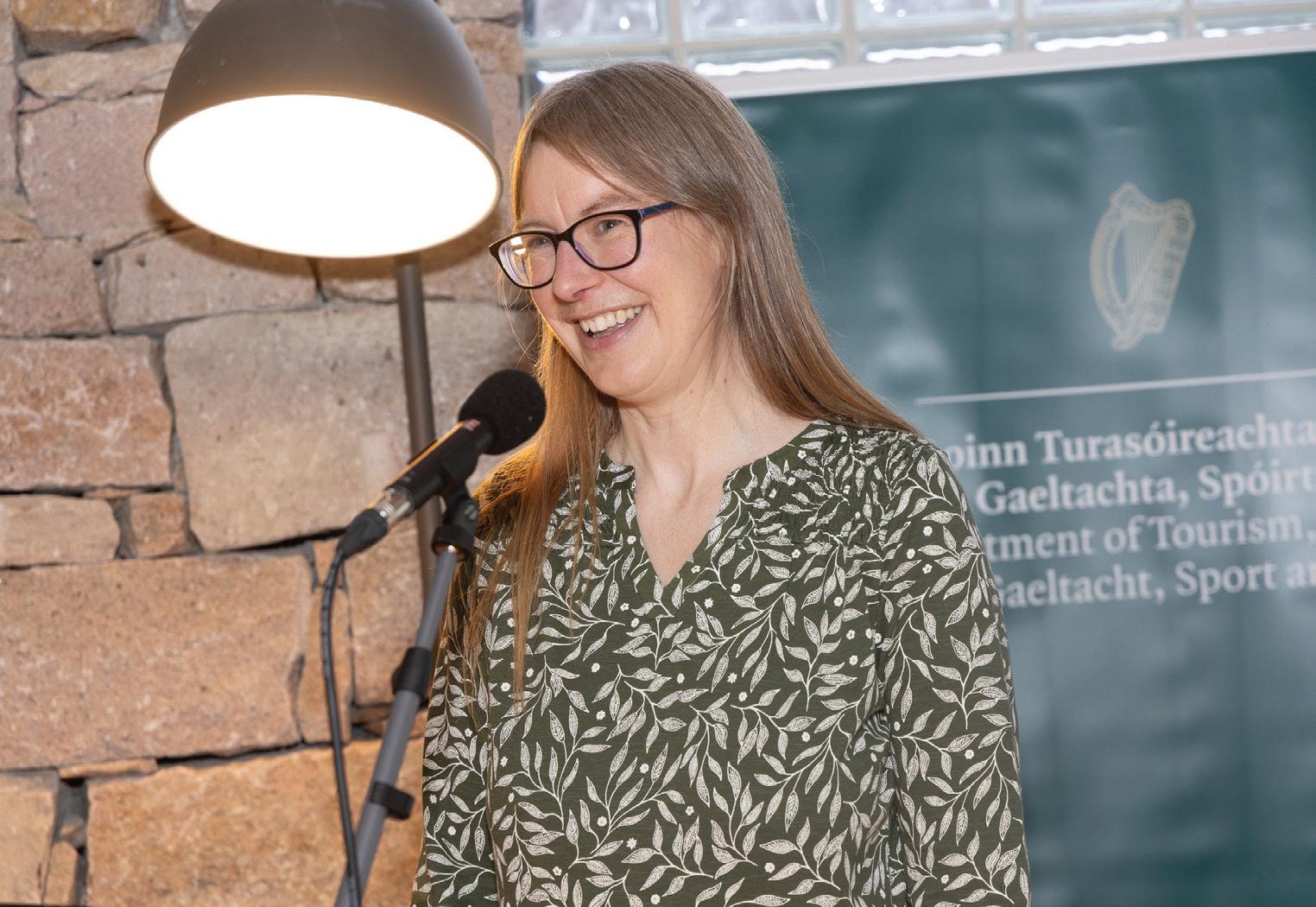






“IT’S ABSOLUTELY BRILLIANT BECAUSE IT’S AN AREA OF WORK WE WANTED TO GROW FOR A LONG TIME AND WE JUST HADN’T HAD FUNDING FOR IT.”
language. When we went to primary school here, we were pretty much the only kids who didn’t know Irish, but we just soaked it in, as you do at that age.”
Growing up, her ears were lled with the sounds of both classical music at home and the traditional music of the area, attending weekly classes given by artists who came out from Siamsa Tíre in Tralee. Holstead began her career as a composer, a er studying music rstly at Trinity College Dublin, before completing a PhD in composition at Queen’s University Belfast. She has written for the Irish Baroque Orchestra, Irish Chamber Orchestra and Ulster Orchestra, and was commissioned by RTÉ to compose a short string quartet for Seamus Heaney’s 70th birthday celebrations.
Re ecting back on that time of her life now she says, “I feel really lucky that it is something I can draw on… It does feel really luxurious to have had the opportunity to do that.” e support of Ealaín na Gaeltachta was crucial to getting her early career as a composer o the ground, bene tting from funding which allowed her to work on composition. She has seen from the other side how valuable it is to support artists and give them the opportunity to create. She fondly recalls being given a little room in An Díseart, an old convent-come-uno cial-arts-centre in Dingle town, to use as a studio while she worked on a piece to commemorate 50 years since the evacuation of the Blasket Islands. “I really appreciate what that kind of support can give you creatively. e di erence it makes to be able to take up an opportunity like that and work with really good people.”
She later spent 10 years on the board of the National Concert Hall and was then appointed as a music advisor to the Arts Council – a consultancy role assessing funding applications which was her rst time looking at arts funding from the other side. “I tried to hold on to the experience of being the artist,” she says, “What’s it’s like to experience those systems and support, or lack of support all the times you apply and don’t get it.”
She describes it as a very privileged position: “You’re getting to see not just what people are doing, but what they want to do. You’re getting to see all of their dreams.” She rst joined Ealaín na Gaeltachta covering maternity leave in Donegal, but when a position came up closer to home, she jumped at the chance to base herself back in Corca Dhuibhne, covering the Munster beat. e broad area stretches from the Dingle Peninsula in Kerry over as far as An Rinn in Waterford and takes in Gaeltacht areas in Cork, including Oileán Chléire (Cape Clear Island).
“As part of the Government’s plan for the Irish language, each Gaeltacht area has developed their own language plan and when that plan has been developed by the community, the Government gives them funding for an Irish language o cer to help
implement the plan,” she explains. An example of where Ealaín na Gaeltachta’s work has been symbiotic with this is on Oileán Chléire where in a beautifully full circle moment, an artist who had come to the island on a residency ended up setting up a residency programme and eventually getting the job of Irish language o cer for the island. “A lot of what he’s doing in that role, he is doing through the arts. e arts are really central to how the language is being supported in the community on the island.”
A new festival and arts event has attracted not only visitors, but other artists to live on the island. is example of the ability of the arts to draw a crowd is important, not just for tourism but also social cohesion and repopulating dwindling communities and of course, keeping the language alive. Her own family history being a case in point – an artist and his family moving to a Gaeltacht area and the children becoming Gaelgeóirí. It’s a pattern that she hopes will replicate in the case of the Ivereagh Peninsula in Co Kerry.
She recalls a number of years ago, “A crisis was identi ed, where the population had plummeted and with it the number of Irish speakers.” An inter-departmental Government task force set about addressing how to reverse that and Ealaín na Gaeltachta was invited to contribute. It guided them to prioritise any opportunities they could support in the area. “What is already happening is artists are moving to the area,” she says, including young couples. “More people are looking to spend time there. ere’s a greater level of concert events, activities, festivals.”
How communities can get to have art as part of their everyday lives is a question she ponders on, aiming to make the arts accessible. She is delighted to see Ealaín na Gaeltachta’s new youth programmes in traditional arts and theatre come to fruition, the results of direct partnership with the Department of Tourism, Culture, Arts, Gaeltacht, Sport and the Media. “It’s absolutely brilliant because it’s an area of work we wanted to grow for a long time and we just hadn’t had funding for it.” e programmes have boosted not only the budgets but also the size of the team, a er 20-odd years running on a team of three aisitheoir and a bainisteoir.
Having been part of developing the current strategy, coming into her new role this year, Holstead is continuing the work in progress and “trying to make sure the systems are supporting the team as well as they can” as well as developing how they invite and incorporate feedback. “ ere’s a constant cycle of review, adjust, see what happens.”
Now in year two of the ve-year strategy, her goal is that “By the time we’re writing our next strategy, we can be con dent in the goals we’re setting out, that they really re ect the needs across our sector and that we can be really ambitious in those goals.”
Ag cur ardchaighdeáin d’iompar corparáideach chun cinn trí dhlí na gcuideachtaí a fhorfheidhmiú.
Promoting high standards of corporate behaviour through the enforcement of company law.
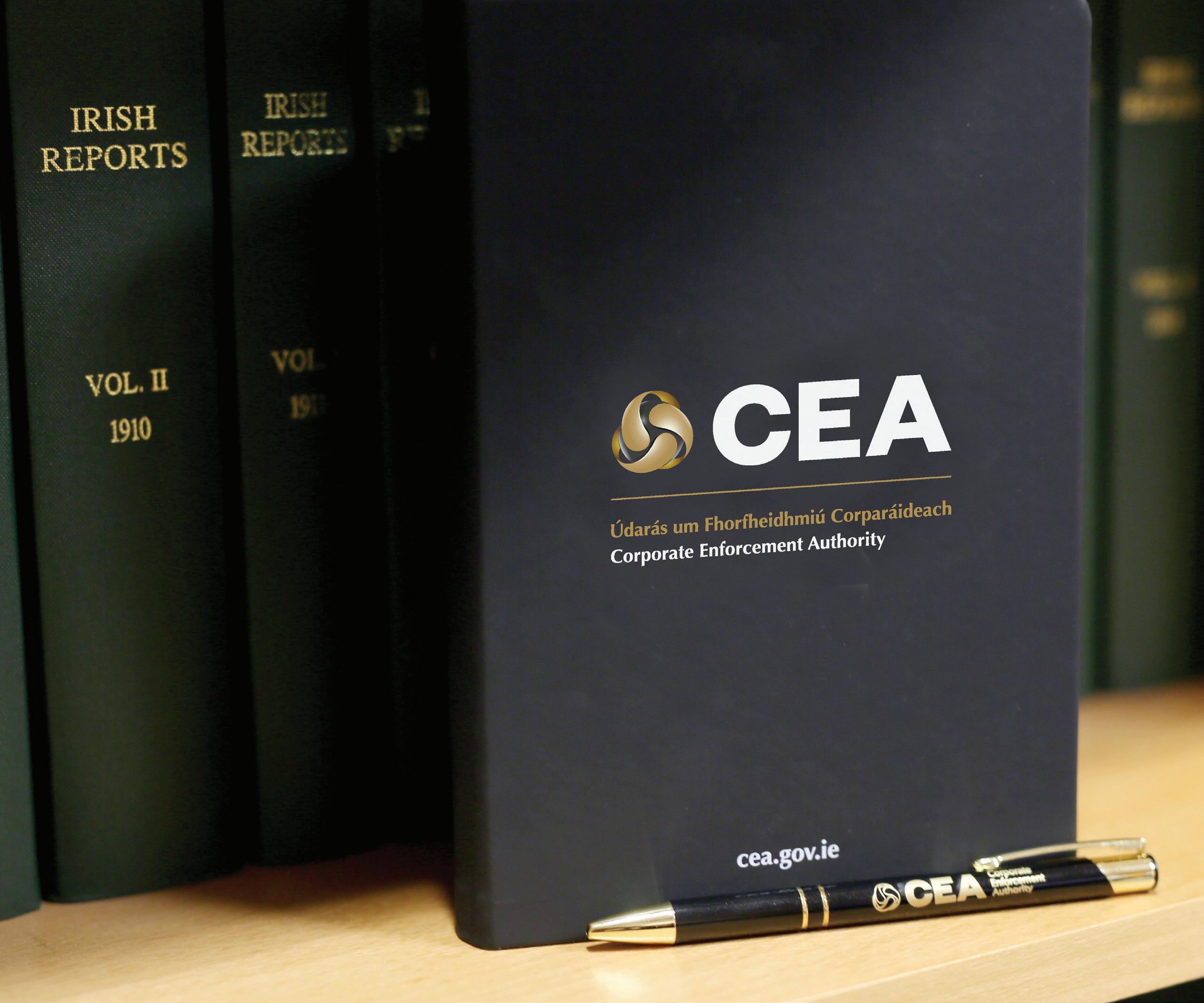
Tabhair cuairt ar ár suíomh gréasáin agus lean muid ar na meáinshóisialta le haghaidh eolas maidir leis an méid seo a leanas:
• do chuid dualgas agus oibleagáidí mar stiúrthóir na cuideachta,
• do chuid cearta mar bhall den chuideachta / mar scairshealbhóir,
• conas gearán, léiriú imní nó nochtadh cosanta a chur faoinár mbráid, agus
• deiseanna gairme linn atá ar na bacáin.

Visit our website and follow us on social media for information on:
• your duties and obligations as a company director,
• your rights as a company member / shareholder,
• how to submit a complaint, expression of concern or protected disclosure to us, and
• upcoming career opportunities with us.
WITH A HIGHLY-QUALIFIED WORKFORCE AND A FOCUS ON CLEANTECH AND RENEWABLE ENERGY, DENMARK IS RATED AMONG THE WORLD’S VERY BEST LOCATIONS FOR DOING BUSINESS
There’s more to Denmark than pastries. e Nordic country with a population of almost 6 million has limited natural resources and little sunshine to attract tourism, so its economy is built around business. Don’t ask for a Danish, by the way – they call them ‘Vienna bread’. Denmark is a constitutional monarchy, with the Prime Minister as head of government; Social Democrat Mette Frederiksen has been serving in the role since 2019. e kingdom also comprises two autonomous constituent countries in the Atlantic, the Faroe Islands and Greenland, neither of which are EU members. Denmark opted out of the euro and still uses Danish krone (DKK).

The Danish way of working is high-focused effort during working hours – including a brief 30-minute lunch with colleagues – and then a shift in focus to family and personal time after work hours. A national network of quality subsidised child-care facilities gives Danish women the opportunity to compete on an equal footing in the labour market.

Donald Trump floated the idea of buying Greenland from Denmark in 2019. The idea was met with a mixture of indignation and hilarity and was swiftly rebuffed –although it is not without historic precedent. In 1917 Woodrow Wilson bought the Danish West Indies for $25 million, renaming them the US Virgin Islands. Harry Truman offered Denmark $100 million for Greenland in 1946 but was turned down.




Over 40 years of ambitious energy policies focusing on renewables have helped put Denmark to the forefront in cleantech. The country aims to be completely independent of fossil fuels by 2050. Denmark also has one of the strongest clusters in the world when it comes to biotech and life science, based on robust public-private partnerships.
No.1


Denmark came 7th
In its most recent survey, the World Bank calls Denmark No. 1 in Europe and No. 4 in the world for ease of doing business.
The Danish government runs education and retraining programs and provides counselling services to get unemployed people back to work as quickly as possible. Denmark’s public and private investment in the development of new qualifications and skills is one of the highest in Europe, maintaining a highlyqualified and well-educated workforce that gives Denmark an edge in the global knowledge economy.
Denmark posted a GDP per capita of
€52,510



(Best Countries for Business 2019, Forbes Business Magazine). in the world of the most inviting countries for capital investment
in 2023, well above the EU average (€29,280), but less than Ireland (€71,700).
Entertaining clients on the company credit card? You’ll be spoilt for choice with the amount of Michelinstarred eateries in Denmark, from the famed Noma, which was named the world’s best restaurant five times, to Geranium, which was the first restaurant in Denmark to achieve three Michelin stars. It has since been joined by Noma and Jordnær, but there are plenty of two- and one-star options as well. As of the 2024 Michelin Guide, there are 31 restaurants in Denmark with a Michelin-star rating.
Denmark has a competitive economy and ranks #1
on the IMD World Competitiveness Ranking 2023. According to IMD, “Denmark reaches the top spot thanks to the quality of its economic policies during the pandemic and gains in international investments.”
Denmark is a leader in terms of renewable energy; 42.4% of its energy consumption came from renewables in 2023.
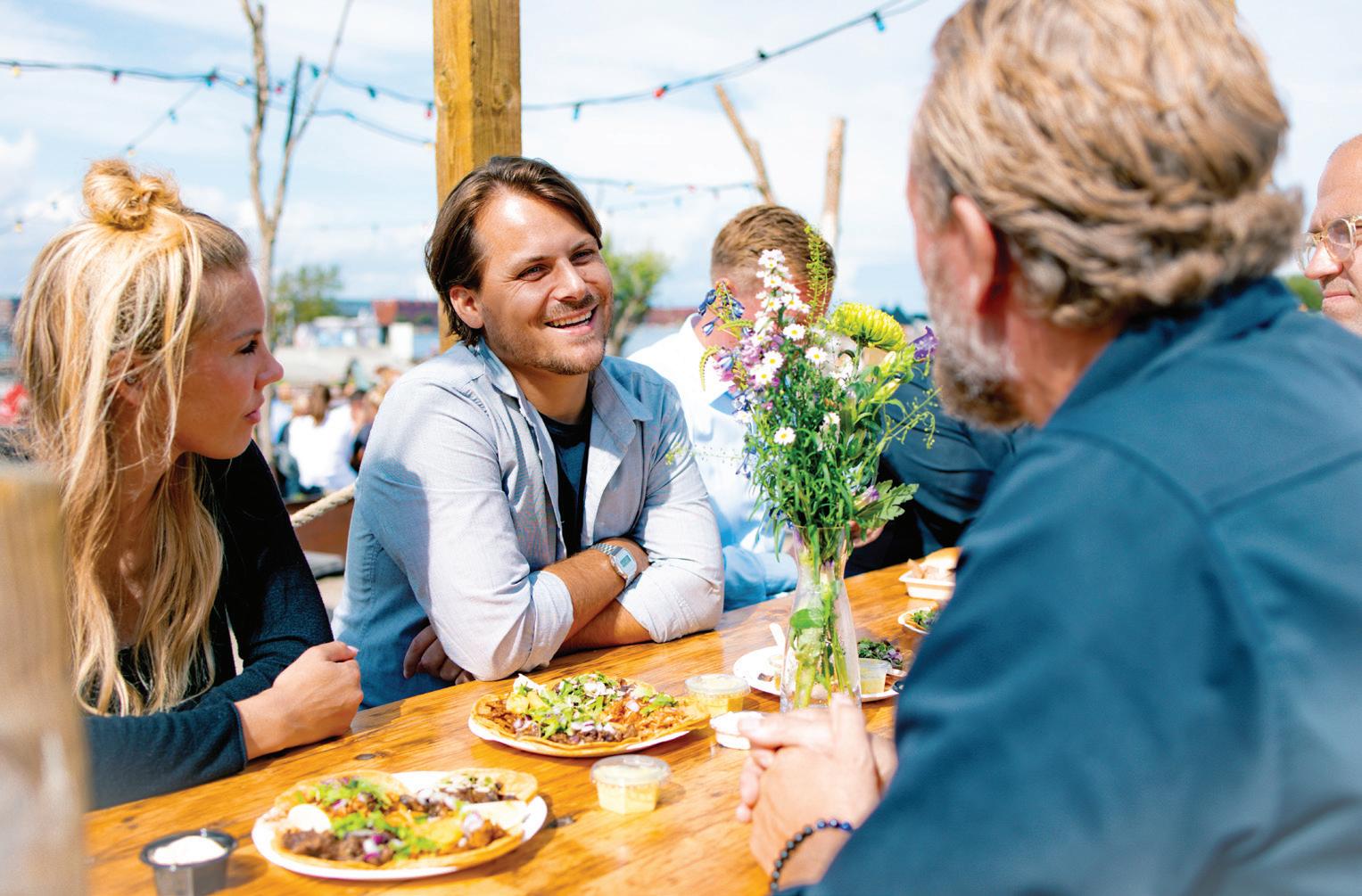
The Danish labour market model is based around ‘flexicurity’ – flexible labour conditions meaning that employers can easily hire and fire to adjust to the needs of the marketplace. Litigation surrounding dismissals is uncommon and employees are protected by a secure safety net in-between jobs. Employees who sign up to an A-kasse (unemployment insurance fund) get up to two years’ dagpenge (unemployment benefit) after losing their jobs. There is also a state subsistence allowance (kontanthjælp) for people who lose their livelihood due to illness, divorce or unemployment, and who do not qualify under other social welfare schemes. The flexible labour market and reliable safety net have helped make globalisation more palatable for Danes – they feel confident that if one job disappears, another is likely to arise in its place. This also means Danes feel comfortable changing jobs in order to advance their careers. Each year, about 25% of the Danes who work in private industry change jobs. The ease of hiring and firing also makes Danish employers more willing to take a chance on people who might otherwise be left outside the labour market.
There is a long tradition of dialogue between employer associations and labour unions. There is no legal minimum wage in Denmark; wages and working conditions are based on collectively negotiated agreements and the government rarely interferes. Around 67% of Danish workers are union members but strikes are not common as there is a prevailing sense of duty to reach an agreement that will benefit society at large.

Punctuality is a way of life in Denmark. Meet deadlines promptly and turn up on time for meetings and appointments, or call if you are delayed. Engagements tend to be booked very far in advance. A high degree of independence is generally afforded to employees in Denmark to plan their time. Hierarchies can be quite flat and informal. Teamwork and collaboration are important. And most importantly, if it’s your birthday, you bring the cake to the office!


































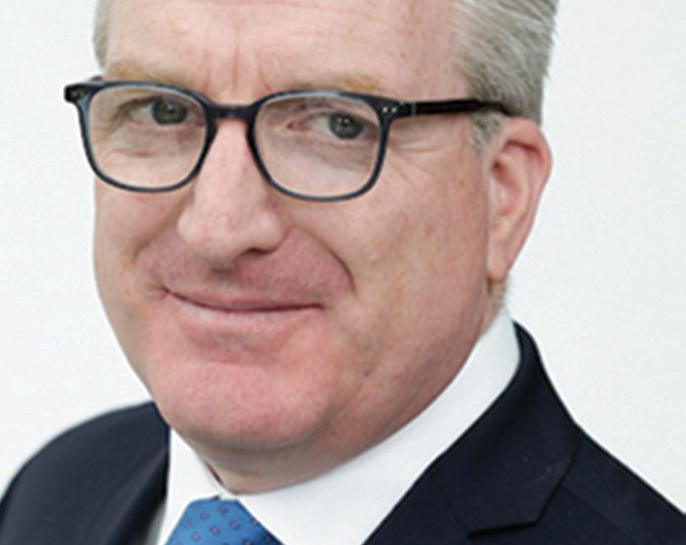
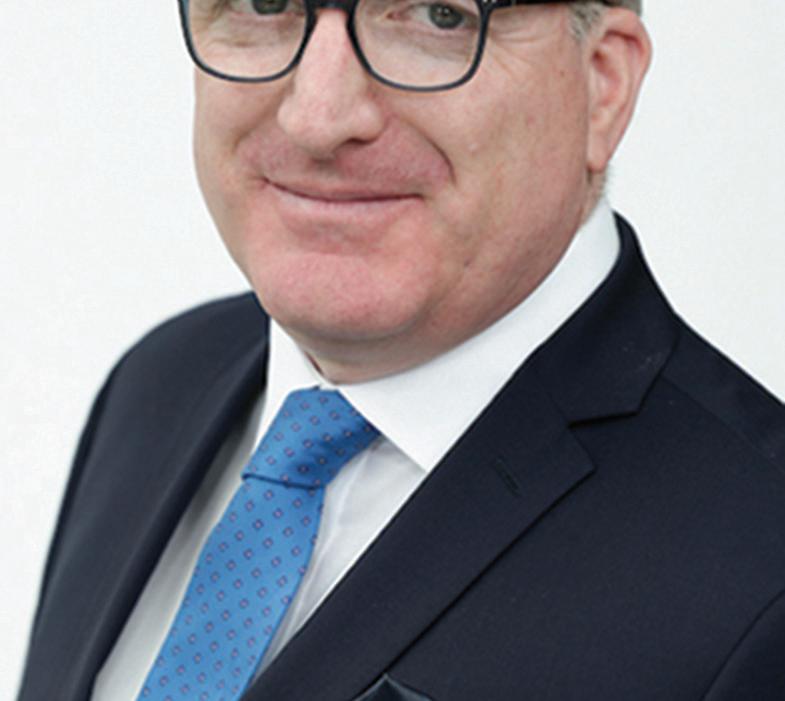
he former British Prime Minister Harold Wilson once said:
“I’m an optimist, but an optimist that carries an umbrella.” Many of the business people we meet have established and grown enterprises, requiring a high level of commitment and resilience and at some point, they start thinking about legacy and passing assets to the next generation. e good news is that they rarely have di culty in nding people who are willing to accept their largesse. ey may not be as happy about paying the Capital Acquisitions Taxes (CAT) that come with it, however there are solutions for those who plan ahead in a prudent manner.
ere are plenty of reliefs that can help mitigate tax liabilities – but vitally, once planning has started early enough. My colleagues in PwC Private would recommend that any business owner should commence discussions around passing on intergenerational wealth well before age 60. For those that are likely to pass on assets over and above the various reliefs, business owners could consider insuring the tax liability that might arise for their bene ciaries.
Section 72 insurance is a whole of life policy, speci cally approved by the Revenue Commissioners. It provides nancial protection against potential inheritance tax liabilities faced by bene ciaries (typically children) upon the policyholder’s death. Where the policy remains in force until the insured person passes away, the proceeds of the policy will be paid out tax-free, if used speci cally to cover an inheritance tax bill.
ere are alternatives, such as saving or investing enough to accumulate money to generate the same net of tax bequest to the estate. ere is also the approach of just letting the next generation pay their own tax liability – also known as “SKIing” or Spending the Kids’ Inheritance. But if you know you want to nd an e cient solution to a potential CAT bill, you could investigate insuring against it – I think Harold Wilson would!
Section 72 policies need to be set up in line with Revenue requirements and in anticipation of a future CAT liability. They will fit particular client circumstances only.
A Section 72 policy is an insurance arrangement and therefore we would be required to go through some typical steps involved in establishing any insurance policies. This consists of completing a fact find, policy application form and a medical questionnaire. In certain instances, the policy provider may seek additional medical information from your GP, with your permission. Once accepted, the policy is put in force and premiums are paid, usually by direct debit.
On death, the insurance company pays out a lump sum. In the case of a jointly held policy, the payout timing under the policy depends on the occurrence of the second policyholder’s death. The proceeds are distributed only when both lives named under the policy have passed away and the Section 72 policy should be considered illiquid until the policyholder’s passing. At the point of payout, it provides a lump sum to the beneficiaries, who use the insurance proceeds to settle the inheritance tax bill. By doing so, they avoid the need to liquidate other assets to pay the tax.






LISA O’CONNELL AT FORUS TRAINING IS UP WITH THE BIRDS, READY TO TAKE ON THE MOST PRESSING ISSUES OF THE DAY FIRST


















WWW.FORUSTRAINING.IE
































5:45AM I’m up to “eat the frog” and deal with the most challenging things first. Blaise Brosnan taught me that and I thank him for it. With a drink of water, I’m on my first meeting at 6am. We’re starting to do business in the Middle East and South Asia so rising early lets me connect with people, customers and sta in those time zones. 7.30AM I wake my son and cook breakfast. My son has autism and he’s a fierce negotiator so tasks can take time. I drive to the o ce with him and then we walk to his school – this is when we have our good chats. 9:30AM I do my first workout of the day. They’re great for helping to clear the mental load. Living in a town like Mullingar is brilliant; everything is really close so I can get from my o ce to the gym in two minutes. 10:30AM I have meetings scheduled until lunchtime. I find a cadence of short, agenda-driven meetings can really connect teams. I have eight team members who work from the o ce and a larger team of 20 working from all corners of Ireland. We run an ongoing Zoom where Rooms are designed to be used by multiple people for impromptu conversations. At Forus Training, we run courses on almost any subject. Our customers include nursing home groups, homecare and early learning organisations. 1PM I have a quick lunch and then head o for my CrossFit class. 2:15PM From here, my day is less structured. I’m usually meeting potential customers, preparing tenders or having one-to-ones with sta . I’m proud of the culture of curiosity and continuous learning that we have cultivated at Forus Training. 5PM I’m o to collect my son from after-school and bring him to one of his activities and then we spend the evening together. Usually, it gets creative and we end up in a pile of cardboard! I make dinner navigating Sellotape, scissors and permanent marker. I steer clear of emails and work after 5pm unless it’s urgent. 9PM After story-time it’s lights out and another half hour for me to reset the living areas and put every device back on charge, ready for another day.






























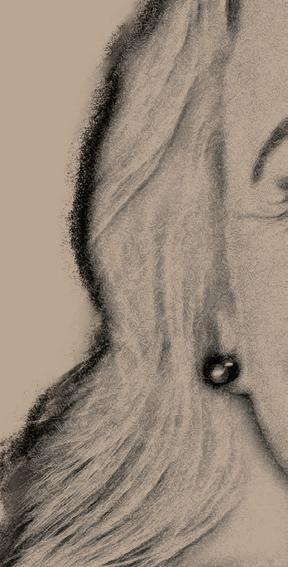




































Lisa O’Connell, Founder and CEO, Forus Training


























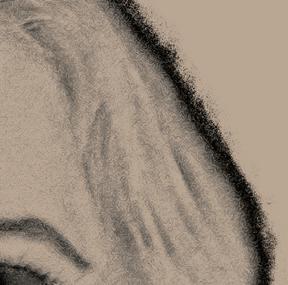

















































































































































“I HAVE MEETINGS SCHEDULED UNTIL LUNCHTIME. I FIND A CADENCE OF SHORT, AGENDA-DRIVEN MEETINGS CAN REALLY CONNECT TEAMS.”










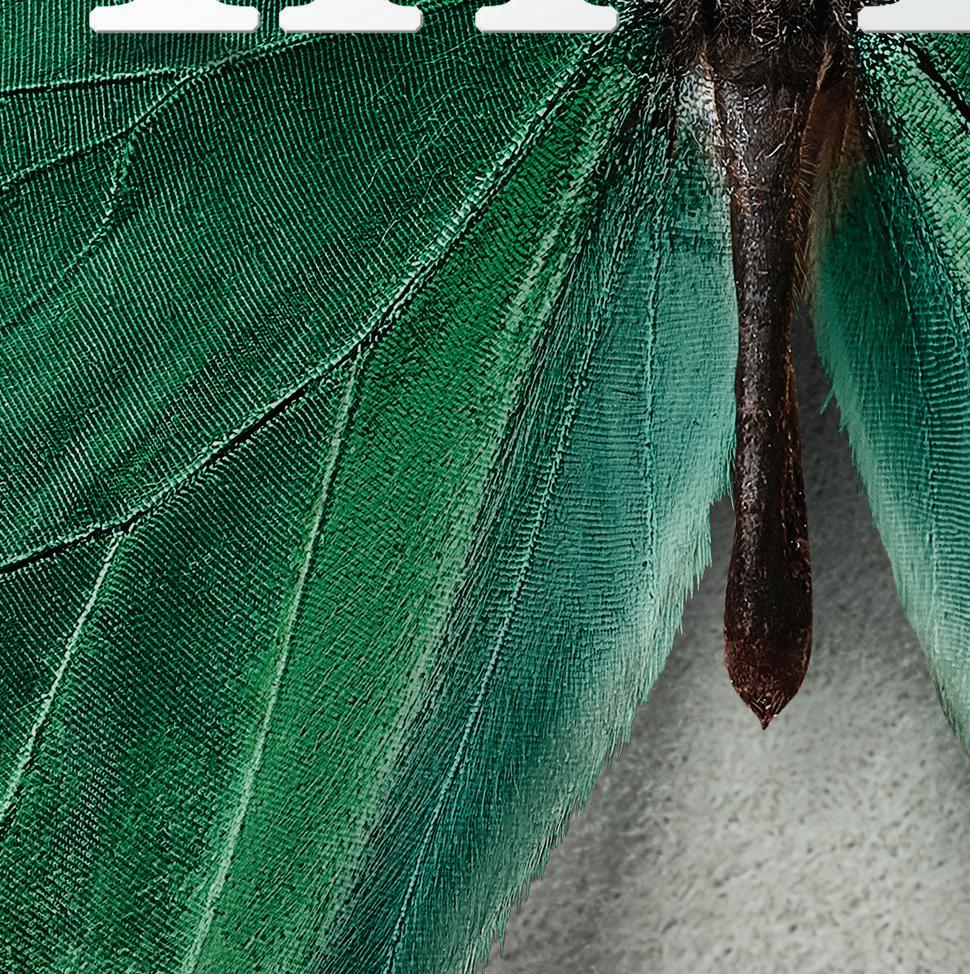


Suppo r t loc a l to l i ft us a l l

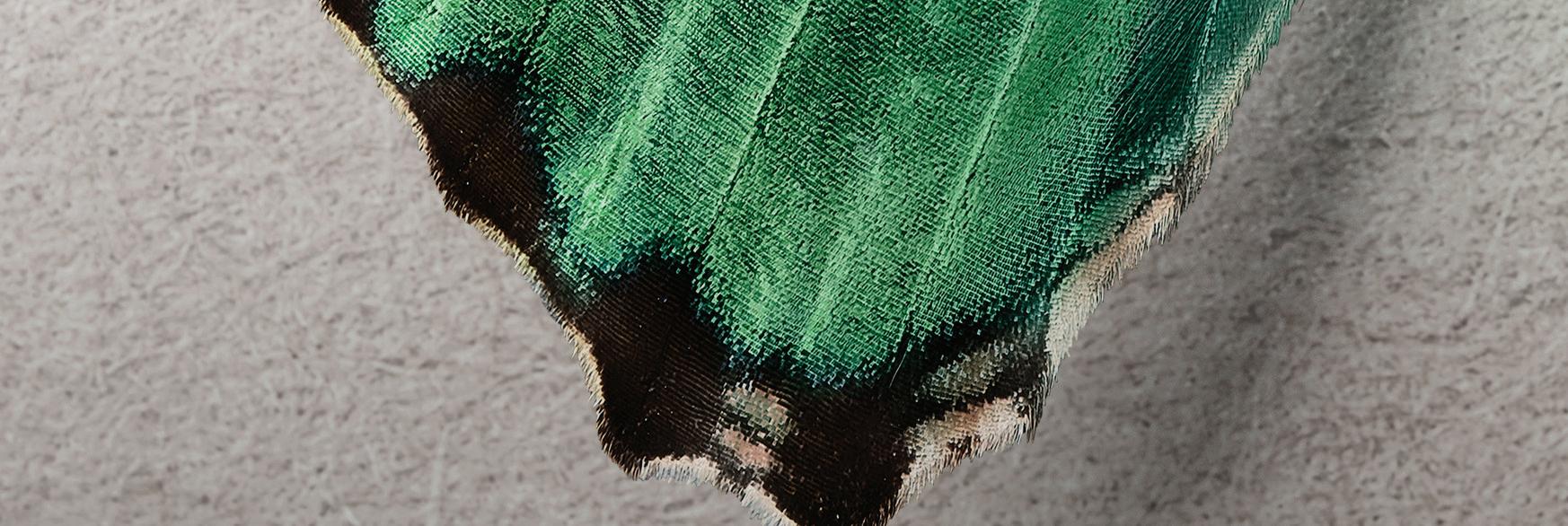


All Ri s e All Ri s e

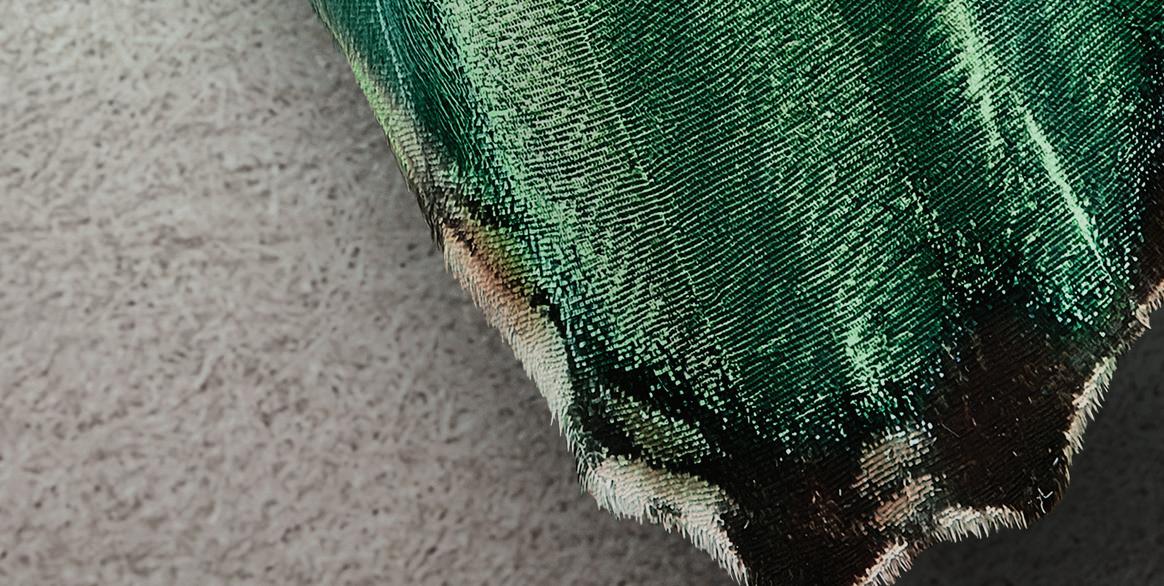
Ch am p i o n G r ee n . i e




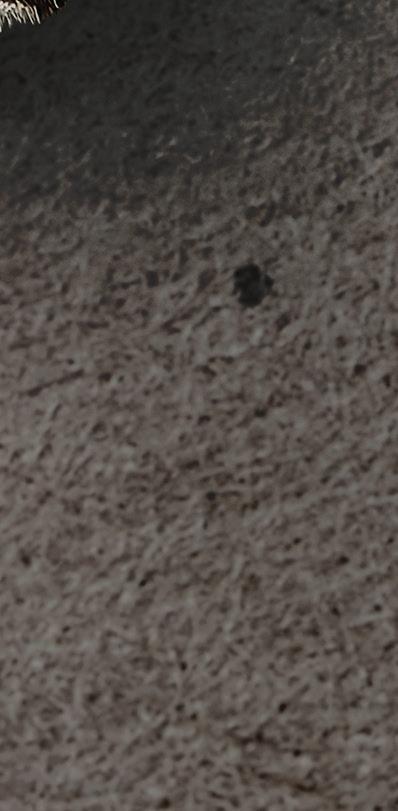












INVEST WITH THE GROWTH AND SUSTAINABILITY LOAN SCHEME.
Enjoy easier access to sustainability finance and ensure future competitiveness for your business.
The scheme is open for applications for SMEs who want to future-proof the business and improve their competitiveness through sustainability.
• LOANS from €25,000 to €3,000,000
• TERMS from 7 to 10 years
• Loans up to €500,000 UNSECURED
• REDUCED interest rates




